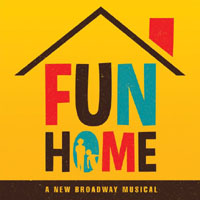 Original Broadway Cast, 2015 (PS Classics)
Original Broadway Cast, 2015 (PS Classics)  (5 / 5) Alison Bechdel’s Fun Home may seem like strange fodder for a Broadway musical. A memoir in the form of a graphic novel, it chronicles Bechdel’s coming out as a lesbian during her freshman year of college — shortly before her father, whom she discovers is a closeted homosexual, commits suicide. But creators Jeanine Tesori, Broadway’s premier female composer, and playwright Lisa Kron, here functioning as both librettist and lyricist, created a dazzling memory musical with a score that is unassuming, yet powerful. The show is narrated by Alison as an adult, played by a grounded Beth Malone; she is struggling to write the memoir as she sorts through her memories, some more vivid than she would like. Flowing in and out of various decades, the songs are variously timely (the faux-’70s-pop “Raincoat of Love”) and timeless (“Telephone Wire,” Bechdel’s recollection of her last moments with her father), all of them beautifully supported by John Clancy’s subtle, elegant orchestrations. Fun Home is a powerful piece that’s given a full, beautiful treatment on the cast recording, thanks to a generous amount of included dialogue. As the doomed father, Bruce, Tony Award winner Michael Cerveris is terrifying and pitiful. Judy Kuhn, as his long suffering wife, Helen, is beautifully restrained in “Days and Days,” a reminiscence of her misused life. Emily Skeggs is adorably awkward as Alison in her college years; but youngster Sydney Lucas, who plays Allison as a child, is the show’s secret weapon. Shedding the stereotype that shadows most child actors, Lucas is mature and strong and in complete control of her performance. Her rendition of “Ring of Keys,” in which a young Alison observes a masculine delivery woman in a diner and experiences her first moment of self-recognition in another person, is the ultimate highlight of the show. That song, like Fun Home as a whole, is destined to become a classic. — Matt Koplik
(5 / 5) Alison Bechdel’s Fun Home may seem like strange fodder for a Broadway musical. A memoir in the form of a graphic novel, it chronicles Bechdel’s coming out as a lesbian during her freshman year of college — shortly before her father, whom she discovers is a closeted homosexual, commits suicide. But creators Jeanine Tesori, Broadway’s premier female composer, and playwright Lisa Kron, here functioning as both librettist and lyricist, created a dazzling memory musical with a score that is unassuming, yet powerful. The show is narrated by Alison as an adult, played by a grounded Beth Malone; she is struggling to write the memoir as she sorts through her memories, some more vivid than she would like. Flowing in and out of various decades, the songs are variously timely (the faux-’70s-pop “Raincoat of Love”) and timeless (“Telephone Wire,” Bechdel’s recollection of her last moments with her father), all of them beautifully supported by John Clancy’s subtle, elegant orchestrations. Fun Home is a powerful piece that’s given a full, beautiful treatment on the cast recording, thanks to a generous amount of included dialogue. As the doomed father, Bruce, Tony Award winner Michael Cerveris is terrifying and pitiful. Judy Kuhn, as his long suffering wife, Helen, is beautifully restrained in “Days and Days,” a reminiscence of her misused life. Emily Skeggs is adorably awkward as Alison in her college years; but youngster Sydney Lucas, who plays Allison as a child, is the show’s secret weapon. Shedding the stereotype that shadows most child actors, Lucas is mature and strong and in complete control of her performance. Her rendition of “Ring of Keys,” in which a young Alison observes a masculine delivery woman in a diner and experiences her first moment of self-recognition in another person, is the ultimate highlight of the show. That song, like Fun Home as a whole, is destined to become a classic. — Matt Koplik
Category Archives: D-F
Forbidden Hollywood
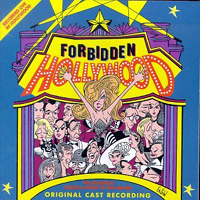 Los Angeles Cast, 1995 (DRG)
Los Angeles Cast, 1995 (DRG)  (3 / 5) Here, Gerard Alessandrini has as much fun with Hollywood excess as with Broadway idiocy. But this recording differs from the Forbidden Broadway albums in one crucial respect: It’s live, and that’s a mistake. The audience keeps howling at sight gags listeners can’t fathom (like Dietrich’s arm falling off in “Falling Apart Again”). The satirical targets are a little strange, too; some numbers aim at movies that were new at the time (Braveheart, Pulp Fiction, Forrest Gump), but nearly half the material clobbers various aspects of decades-old film version of classic Broadway musicals — the color filters in South Pacific, Barbra Streisand’s miscasting in Hello, Dolly! That said, much of it is a riot, and Jason Graae’s impression of Brando singing is as hilarious the twentieth time as the first. Gerry McIntyre is a flawless Louis Armstrong, a funny Whoopi Goldberg, a catatonic Keanu Reeves, and more. Christine Pedi, an unparalleled Liza in several Forbidden Broadways, gets unusually rich material here (“Mein Film Career”). And Suzanne Blakeslee, as Marni Nixon dubbing Audrey Hepburn, does justice to one of the funniest pieces of material Alessandrini has ever written. — Marc Miller
(3 / 5) Here, Gerard Alessandrini has as much fun with Hollywood excess as with Broadway idiocy. But this recording differs from the Forbidden Broadway albums in one crucial respect: It’s live, and that’s a mistake. The audience keeps howling at sight gags listeners can’t fathom (like Dietrich’s arm falling off in “Falling Apart Again”). The satirical targets are a little strange, too; some numbers aim at movies that were new at the time (Braveheart, Pulp Fiction, Forrest Gump), but nearly half the material clobbers various aspects of decades-old film version of classic Broadway musicals — the color filters in South Pacific, Barbra Streisand’s miscasting in Hello, Dolly! That said, much of it is a riot, and Jason Graae’s impression of Brando singing is as hilarious the twentieth time as the first. Gerry McIntyre is a flawless Louis Armstrong, a funny Whoopi Goldberg, a catatonic Keanu Reeves, and more. Christine Pedi, an unparalleled Liza in several Forbidden Broadways, gets unusually rich material here (“Mein Film Career”). And Suzanne Blakeslee, as Marni Nixon dubbing Audrey Hepburn, does justice to one of the funniest pieces of material Alessandrini has ever written. — Marc Miller
Forbidden Broadway
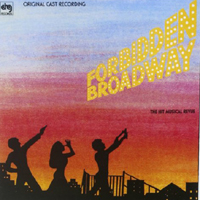 Original Cast, 1982 (DRG)
Original Cast, 1982 (DRG)  (3 / 5) Gerard Alessandrini’s revues lampooning Broadway hits and personalities have been a reliable source of merriment in cabaret rooms, Off-Broadway theaters, and other venues throughout the U.S. and abroad since the early 1980s. “Wicked” is the adjective most often applied to these knowing parodies of show tunes and celebrities, but there’s usually affection at their base. More than that, Alessandrini’s a talented lyricist in his own right, particularly adept at turning a well-known lyric or show title on its head with a subtle tweak — e.g., “I Wonder What the King Is Drinking Tonight,” “Into the Words,” “Rant.” And his revues have showcased some of New York’s brightest talents, young pros with great gifts for mimicry. Of course, there’s no way to duplicate the visual components that send audiences into uncontrollable laughter, such as the hilarious costumes (often by the legendary Alvin Colt) and tiny sets spoofing enormous ones. Since the FB cast recordings are essentially comedy albums and repeated listening can diminish the jokes, they may linger on your CD shelves for long intervals, but they’re fun to revisit as a reminder of the ridiculous foibles of a given season. This first Forbidden Broadway album is one of the best, though by far the shortest at 40 minutes. Alessandrini usually writes one entirely original title song for each edition of the show, and there’s a particularly apt one here, with lyrics such as: “There’s a Great White Way / Where the white is gray / And the great is only okay.” The writer himself is also in the cast, doing a killer Topol in “Ambition.” The invaluable Nora Mae Lyng is a brassy Ann Miller and a brassier Ethel Merman, future indie-film star Chloe Webb a pert Andrea McArdle, and Bill Carmichael a funny emcee announcing, “Hats off, here they come, those . . . bankable stars.” As always, the one-piano accompaniment (here by musical director Fred Barton) manages to sound like a whole orchestra. Subsequent FB albums are more complete and more nastily funny, but this one has a hottest-new-show-in-town oomph. It also has that great Merrily We Roll Along parody poster art on its cover.– Marc Miller
(3 / 5) Gerard Alessandrini’s revues lampooning Broadway hits and personalities have been a reliable source of merriment in cabaret rooms, Off-Broadway theaters, and other venues throughout the U.S. and abroad since the early 1980s. “Wicked” is the adjective most often applied to these knowing parodies of show tunes and celebrities, but there’s usually affection at their base. More than that, Alessandrini’s a talented lyricist in his own right, particularly adept at turning a well-known lyric or show title on its head with a subtle tweak — e.g., “I Wonder What the King Is Drinking Tonight,” “Into the Words,” “Rant.” And his revues have showcased some of New York’s brightest talents, young pros with great gifts for mimicry. Of course, there’s no way to duplicate the visual components that send audiences into uncontrollable laughter, such as the hilarious costumes (often by the legendary Alvin Colt) and tiny sets spoofing enormous ones. Since the FB cast recordings are essentially comedy albums and repeated listening can diminish the jokes, they may linger on your CD shelves for long intervals, but they’re fun to revisit as a reminder of the ridiculous foibles of a given season. This first Forbidden Broadway album is one of the best, though by far the shortest at 40 minutes. Alessandrini usually writes one entirely original title song for each edition of the show, and there’s a particularly apt one here, with lyrics such as: “There’s a Great White Way / Where the white is gray / And the great is only okay.” The writer himself is also in the cast, doing a killer Topol in “Ambition.” The invaluable Nora Mae Lyng is a brassy Ann Miller and a brassier Ethel Merman, future indie-film star Chloe Webb a pert Andrea McArdle, and Bill Carmichael a funny emcee announcing, “Hats off, here they come, those . . . bankable stars.” As always, the one-piano accompaniment (here by musical director Fred Barton) manages to sound like a whole orchestra. Subsequent FB albums are more complete and more nastily funny, but this one has a hottest-new-show-in-town oomph. It also has that great Merrily We Roll Along parody poster art on its cover.– Marc Miller
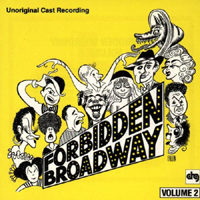 Forbidden Broadway: Volume 2 — Compilation Album, 1991 (DRG)
Forbidden Broadway: Volume 2 — Compilation Album, 1991 (DRG)  (3 / 5) For the best stuff in this compilation of Forbidden Broadway material from 1985 to 1991, check out Toni DiBuono capturing Patti LuPone down to the last self-indulgent nuance (“I Get a Kick Out of Me”), an ingenious My Fair Lady parody (“I Strain in Vain to Train Madonna’s Brain”) inspired by Madonna’s Broadway stint in Speed the Plow, Kevin Ligon as an amazing Mandy Patinkin (“Somewhat Overindulgent”), and one of the most famous and popular sequences in Forbidden Broadway history: the epic spoof of Les Misérables (“At the end of the play, you’re another year older.”) There are also winning performances by Michael McGrath and Karen Murphy. Not all of the tracks are for everybody; you have to have seen the original M. Butterfly, for instance, to appreciate the satiric puzzlement over its success. A backhanded salute to The Phantom of the Opera is a bit compromised because Andrew Lloyd Webber wouldn’t allow his music to be used without alteration, but the righteous indignation expressed over a relatively fallow era in Broadway musical history makes for a very entertaining hour-plus of listening. — M.M.
(3 / 5) For the best stuff in this compilation of Forbidden Broadway material from 1985 to 1991, check out Toni DiBuono capturing Patti LuPone down to the last self-indulgent nuance (“I Get a Kick Out of Me”), an ingenious My Fair Lady parody (“I Strain in Vain to Train Madonna’s Brain”) inspired by Madonna’s Broadway stint in Speed the Plow, Kevin Ligon as an amazing Mandy Patinkin (“Somewhat Overindulgent”), and one of the most famous and popular sequences in Forbidden Broadway history: the epic spoof of Les Misérables (“At the end of the play, you’re another year older.”) There are also winning performances by Michael McGrath and Karen Murphy. Not all of the tracks are for everybody; you have to have seen the original M. Butterfly, for instance, to appreciate the satiric puzzlement over its success. A backhanded salute to The Phantom of the Opera is a bit compromised because Andrew Lloyd Webber wouldn’t allow his music to be used without alteration, but the righteous indignation expressed over a relatively fallow era in Broadway musical history makes for a very entertaining hour-plus of listening. — M.M.
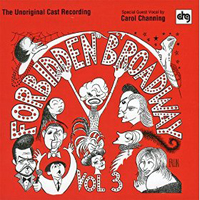 Forbidden Broadway: Volume 3, 1993 (DRG)
Forbidden Broadway: Volume 3, 1993 (DRG)  (2 / 5) This third edition’s opening number is weak, a CD-only appearance by Carol Channing and a stageful of imitators. But some first-class stuff follows: devastating slaps at Petula Clark and David Cassidy in Blood Brothers, Suzanne Blakeslee’s astonishing evocation of Julie Andrews, and Craig Wells’ hilarious put-down of Michael Crawford. On the whole, however, that season’s shows weren’t as ripe for parody as those of other seasons. Dustin Hoffman as Shylock filtered through Rain Man doesn’t hold up, and Topol’s stodginess in Fiddler was old news even in ’93; so was Robert Goulet’s Vegas slickness. Still, the intermittent pleasures keep coming, including quick riffs on the scenery chewing of Nathan Lane and Faith Prince in Guys and Dolls, a knockdown punch at Liliane Montevecchi, and an efficient torching of Miss Saigon. — M.M.
(2 / 5) This third edition’s opening number is weak, a CD-only appearance by Carol Channing and a stageful of imitators. But some first-class stuff follows: devastating slaps at Petula Clark and David Cassidy in Blood Brothers, Suzanne Blakeslee’s astonishing evocation of Julie Andrews, and Craig Wells’ hilarious put-down of Michael Crawford. On the whole, however, that season’s shows weren’t as ripe for parody as those of other seasons. Dustin Hoffman as Shylock filtered through Rain Man doesn’t hold up, and Topol’s stodginess in Fiddler was old news even in ’93; so was Robert Goulet’s Vegas slickness. Still, the intermittent pleasures keep coming, including quick riffs on the scenery chewing of Nathan Lane and Faith Prince in Guys and Dolls, a knockdown punch at Liliane Montevecchi, and an efficient torching of Miss Saigon. — M.M.
 Forbidden Broadway Strikes Back!, 1996 (DRG)
Forbidden Broadway Strikes Back!, 1996 (DRG)  (4 / 5) A luxurious 73 minutes of what might be Gerard Alessandrini’s most consistent bouquet of parodies, this edition benefits from top-flight talent. The opening number (“Parody Tonight”) serves up Tom Plotkin’s expert Nathan Lane, Christine Pedi’s gurgling Liza, Donna English’s sneering Zoe Caldwell, and Bryan Batt’s vapid John Davidson in State Fair beaming through “Oh, What a Beautiful Moron!” It’s an auspicious start, and the recording seldom flags from there. There are digs at Harold Prince’s enormous Show Boat, the failed promise of Big, and casting prospects for the upcoming Kiss Me, Kate revival (Pedi’s Bernadette Peters and Batt’s Mandy Patinkin duet in “So Miscast”). English does the best Julie Andrews you’ve ever heard in an extended pummeling of Victor/Victoria (with the Tony nominating committee warbling, “Victor/Victoria, we will ignore-ee-ya”), and a brilliant parody of Rent encapsulates the frustrations of that show’s dissenters. Even the arrangements are funny; listen to the Sondheimisms in the King and I send-up. The album is a hoot, and there’s a terrific bonus track: English as Julie again, in a parody of Star! that’s truly hilarious. — M.M.
(4 / 5) A luxurious 73 minutes of what might be Gerard Alessandrini’s most consistent bouquet of parodies, this edition benefits from top-flight talent. The opening number (“Parody Tonight”) serves up Tom Plotkin’s expert Nathan Lane, Christine Pedi’s gurgling Liza, Donna English’s sneering Zoe Caldwell, and Bryan Batt’s vapid John Davidson in State Fair beaming through “Oh, What a Beautiful Moron!” It’s an auspicious start, and the recording seldom flags from there. There are digs at Harold Prince’s enormous Show Boat, the failed promise of Big, and casting prospects for the upcoming Kiss Me, Kate revival (Pedi’s Bernadette Peters and Batt’s Mandy Patinkin duet in “So Miscast”). English does the best Julie Andrews you’ve ever heard in an extended pummeling of Victor/Victoria (with the Tony nominating committee warbling, “Victor/Victoria, we will ignore-ee-ya”), and a brilliant parody of Rent encapsulates the frustrations of that show’s dissenters. Even the arrangements are funny; listen to the Sondheimisms in the King and I send-up. The album is a hoot, and there’s a terrific bonus track: English as Julie again, in a parody of Star! that’s truly hilarious. — M.M.
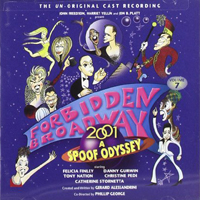 Forbidden Broadway 2001: A Spoof Odyssey, 2000 (DRG)
Forbidden Broadway 2001: A Spoof Odyssey, 2000 (DRG)  (3 / 5) This edition averages out slightly below the series’ general level of inspiration. The first few tracks evaporate, and we don’t get a direct hit until the disembowelment of The Music Man, featuring a very funny Danny Gurwin. Other choice bits: a number that deals with Disney’s downsizing of Beauty and the Beast; Christine Pedi’s slaughtering of Liza Minnelli, not to mention her uncanny turns as Patti LuPone and Gwen Verdon; and an extended riff on Aida that will tickle even those unfamiliar with the show. Alessandrini’s take on Cheryl Ladd in Annie Get Your Gun (“I’ve No Business in Show Business”) epitomizes his art, and Tony Nation’s spoof of James Carpinello in Saturday Night Fever (“Stayin’ Away”) is a deft shot at an easy target, but the digs at Sondheim and Streisand don’t land as smoothly as usual. The album sends customers out on a high note with “76 Hit Shows,” but there wasn’t much to celebrate on Broadway in 2000, so it seems disingenuous to pretend that there was. — M.M.
(3 / 5) This edition averages out slightly below the series’ general level of inspiration. The first few tracks evaporate, and we don’t get a direct hit until the disembowelment of The Music Man, featuring a very funny Danny Gurwin. Other choice bits: a number that deals with Disney’s downsizing of Beauty and the Beast; Christine Pedi’s slaughtering of Liza Minnelli, not to mention her uncanny turns as Patti LuPone and Gwen Verdon; and an extended riff on Aida that will tickle even those unfamiliar with the show. Alessandrini’s take on Cheryl Ladd in Annie Get Your Gun (“I’ve No Business in Show Business”) epitomizes his art, and Tony Nation’s spoof of James Carpinello in Saturday Night Fever (“Stayin’ Away”) is a deft shot at an easy target, but the digs at Sondheim and Streisand don’t land as smoothly as usual. The album sends customers out on a high note with “76 Hit Shows,” but there wasn’t much to celebrate on Broadway in 2000, so it seems disingenuous to pretend that there was. — M.M.
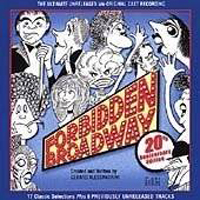 20th Anniversary Edition — Compilation Album, 2000 (DRG)
20th Anniversary Edition — Compilation Album, 2000 (DRG)  (4 / 5) If you’re not a Forbidden Broadway completist but want to know what all the fuss is about, this compilation, featuring eight previously unreleased tracks, is just the thing. Both the strengths and occasional weaknesses of the format come through ringingly, and the prodigiously talented cast offers more variety than a single-edition album would. Not all the spoofs are top-drawer; that Carol Channing parody really should be retired. What a pleasure, though, to re-encounter Christine Pedi’s flawless invocations of Liza and Stritch, Toni DiBuono’s uncanny Patti LuPone, and Alessandrini’s particular distaste for Broadway Disneyfication. Among the bonus tracks are some of his very best vignettes, such as Terri White’s glorious “Screamgirls” and the total demolition of Aspects of Love (“Love Changes Everything” becomes “I Sleep With Everyone”). Note how the various musical directors/accompanists throughout the history of Forbidden Broadway express entire orchestrations with one piano. Note also how they exaggerate cast album affectations — languorous tempi for Les Miz, the heavy bass tread of a Rodgers 4/4 tempo–to great effect. — M.M.
(4 / 5) If you’re not a Forbidden Broadway completist but want to know what all the fuss is about, this compilation, featuring eight previously unreleased tracks, is just the thing. Both the strengths and occasional weaknesses of the format come through ringingly, and the prodigiously talented cast offers more variety than a single-edition album would. Not all the spoofs are top-drawer; that Carol Channing parody really should be retired. What a pleasure, though, to re-encounter Christine Pedi’s flawless invocations of Liza and Stritch, Toni DiBuono’s uncanny Patti LuPone, and Alessandrini’s particular distaste for Broadway Disneyfication. Among the bonus tracks are some of his very best vignettes, such as Terri White’s glorious “Screamgirls” and the total demolition of Aspects of Love (“Love Changes Everything” becomes “I Sleep With Everyone”). Note how the various musical directors/accompanists throughout the history of Forbidden Broadway express entire orchestrations with one piano. Note also how they exaggerate cast album affectations — languorous tempi for Les Miz, the heavy bass tread of a Rodgers 4/4 tempo–to great effect. — M.M.
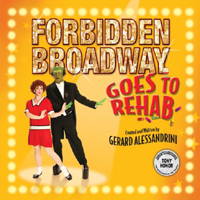 Forbidden Broadway Goes to Rehab, 2009 (DRG)
Forbidden Broadway Goes to Rehab, 2009 (DRG)  (3 / 5) This wasn’t one of the more thrilling Broadway seasons to spoof, but Alessandrini did a workmanlike job of finding targets, and in some cases, much better than workmanlike. Gina Kreiezmar doesn’t sound a great deal like Ashley Brown, but her “Feed the Burbs,” mocking Mary Poppins, is Alessandrini’s most concise and hilarious skewering of the Disneyfication of Broadway. Christina Bianco’s vocally challenged Bernadette Peters, in “See Me on a Monday” (one of several bonus tracks), is mean in a very funny way. Some straight-play parodies, of August: Osage County and Daniel Radcliffe in Equus (with James Donegan as Radcliffe), get the job done. Michael West is a delectably overblown James Barbour in a Tale of Two Cities spoof, and a number in which Kreiezmar as Patti LuPone taunts West as Boyd Gaines with “Small Part, Isn’t It?” is deftly done. — M.M.
(3 / 5) This wasn’t one of the more thrilling Broadway seasons to spoof, but Alessandrini did a workmanlike job of finding targets, and in some cases, much better than workmanlike. Gina Kreiezmar doesn’t sound a great deal like Ashley Brown, but her “Feed the Burbs,” mocking Mary Poppins, is Alessandrini’s most concise and hilarious skewering of the Disneyfication of Broadway. Christina Bianco’s vocally challenged Bernadette Peters, in “See Me on a Monday” (one of several bonus tracks), is mean in a very funny way. Some straight-play parodies, of August: Osage County and Daniel Radcliffe in Equus (with James Donegan as Radcliffe), get the job done. Michael West is a delectably overblown James Barbour in a Tale of Two Cities spoof, and a number in which Kreiezmar as Patti LuPone taunts West as Boyd Gaines with “Small Part, Isn’t It?” is deftly done. — M.M.
A Funny Thing Happened on the Way to the Forum
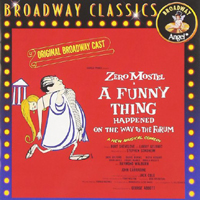 Original Broadway Cast, 1962 (Capitol/Angel)
Original Broadway Cast, 1962 (Capitol/Angel)  (4 / 5) Except for the “House of Marcus Lycus” sequence and the courtesans’ dances, every important piece of music in this playful, skillful Stephen Sondheim score is included here, along with just enough dialogue to allow the listener to appreciate the songs in context. The album captures the indelible performances of the great clowns Zero Mostel, Jack Gilford, David Burns, and their fellow low-vaudevillians. Brian Davies and Preshy Marker imbue the romantic couple Hero and Philia with sweetness, although the recording misses the daffy humor that they brought to these roles onstage. As the stentorian Domina, Ruth Kobart finally explodes in “That Dirry Old Man” and makes it clear why she received a Tony Award nomination for her performance. The album is dominated by Mostel in “Comedy Tonight,” “Free,” and other gems, but almost all of the principals have their shining moments, especially Ron Holgate as a hilarious Miles Gloriosus in “Bring Me My Bride.” The visual gags that convulsed audiences cannot be found here, of course, but this delightful recording will give your imagination a prod. Listening to “Everybody Ought to Have a Maid,” you can almost picture Messrs. Mostel, Gilford, Burns, and David Carradine ambling across the stage of the Alvin Theater. — Jeffrey Dunn
(4 / 5) Except for the “House of Marcus Lycus” sequence and the courtesans’ dances, every important piece of music in this playful, skillful Stephen Sondheim score is included here, along with just enough dialogue to allow the listener to appreciate the songs in context. The album captures the indelible performances of the great clowns Zero Mostel, Jack Gilford, David Burns, and their fellow low-vaudevillians. Brian Davies and Preshy Marker imbue the romantic couple Hero and Philia with sweetness, although the recording misses the daffy humor that they brought to these roles onstage. As the stentorian Domina, Ruth Kobart finally explodes in “That Dirry Old Man” and makes it clear why she received a Tony Award nomination for her performance. The album is dominated by Mostel in “Comedy Tonight,” “Free,” and other gems, but almost all of the principals have their shining moments, especially Ron Holgate as a hilarious Miles Gloriosus in “Bring Me My Bride.” The visual gags that convulsed audiences cannot be found here, of course, but this delightful recording will give your imagination a prod. Listening to “Everybody Ought to Have a Maid,” you can almost picture Messrs. Mostel, Gilford, Burns, and David Carradine ambling across the stage of the Alvin Theater. — Jeffrey Dunn
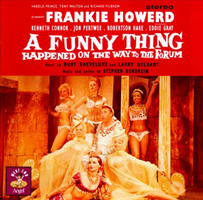 Original London Cast, 1963 (HMV/Angel)
Original London Cast, 1963 (HMV/Angel)  (2 / 5) Typical of many London cast recordings, this one includes more dialogue than the Broadway album. Frankie Howerd stars as Pseudolus, leading a … Forum cast made up of Britain’s comic hierarchy under the direction of the great George Abbott. The original orchestrations by Sid Ramin and Irwin Kostal are conducted by Alyn Ainsworth, and the sound quality here is excellent throughout. “Comedy Tonight” is almost complete (only the introduction of the Proteans is missing), and there are full dialogue lead-ins to “Free,” “Lovely,” “Pretty Little Picture,” “Bring Me My Bride,” “That’ll Show Him,” the “Lovely” reprise, and “The Funeral Sequence.” But how do the London cast members stack up against their Broadway counterparts? Well, these actors seem reserved in their approach to the high art of low comedy. Also, Howerd often misses the mark as a singer. The others are reasonably musical, but they lack comic impact. As Philia, Isla Blair has a thin voice that is tremulous and colorless in “That’ll Show Him.” Hero is played by John Rye with a mature baritone voice that sounds much more well suited to Miles Gloriosus; that part is sung by Leon Greene with comic credibility, but without the stentorian tones required. Linda Gray’s adequate “That Dirty Old Man” is totally outclassed by Ruth Kobart’s rendition on the Broadway album. While this disc wins points for completeness, it loses points for its several lackluster performances. — J.D.
(2 / 5) Typical of many London cast recordings, this one includes more dialogue than the Broadway album. Frankie Howerd stars as Pseudolus, leading a … Forum cast made up of Britain’s comic hierarchy under the direction of the great George Abbott. The original orchestrations by Sid Ramin and Irwin Kostal are conducted by Alyn Ainsworth, and the sound quality here is excellent throughout. “Comedy Tonight” is almost complete (only the introduction of the Proteans is missing), and there are full dialogue lead-ins to “Free,” “Lovely,” “Pretty Little Picture,” “Bring Me My Bride,” “That’ll Show Him,” the “Lovely” reprise, and “The Funeral Sequence.” But how do the London cast members stack up against their Broadway counterparts? Well, these actors seem reserved in their approach to the high art of low comedy. Also, Howerd often misses the mark as a singer. The others are reasonably musical, but they lack comic impact. As Philia, Isla Blair has a thin voice that is tremulous and colorless in “That’ll Show Him.” Hero is played by John Rye with a mature baritone voice that sounds much more well suited to Miles Gloriosus; that part is sung by Leon Greene with comic credibility, but without the stentorian tones required. Linda Gray’s adequate “That Dirty Old Man” is totally outclassed by Ruth Kobart’s rendition on the Broadway album. While this disc wins points for completeness, it loses points for its several lackluster performances. — J.D.
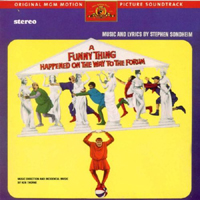 Film Soundtrack, 1966 (United Artists) No stars; not recommended. The film version of A Funny Thing Happened on the Way to the Forum was directed by Richard Lester in a manic style that made the songs virtually superfluous. This very funny film deleted any song that did not have overt comedic value. Those that remain are “Comedy Tonight,” “Lovely” (both versions), “Everybody Ought to Have A Maid,” “Bring Me My Bride,” and “The Funeral Sequence” (listed here as “The Dirge”). The rest of the recording consists of music by Ken Thorne, who only utilizes Sondheim’s themes in two selections. Zero Mostel (Pseudolus) and Jack Gilford (Hysterium) recreated their Broadway roles, and Leon Greene (Miles) his London role; they make solid contributions. It’s also of interest to hear a young Michael Crawford as Hero singing “Lovely.” Still, this disc is only for collectors who feel they need to have every single Sondheim recording. — J.D.
Film Soundtrack, 1966 (United Artists) No stars; not recommended. The film version of A Funny Thing Happened on the Way to the Forum was directed by Richard Lester in a manic style that made the songs virtually superfluous. This very funny film deleted any song that did not have overt comedic value. Those that remain are “Comedy Tonight,” “Lovely” (both versions), “Everybody Ought to Have A Maid,” “Bring Me My Bride,” and “The Funeral Sequence” (listed here as “The Dirge”). The rest of the recording consists of music by Ken Thorne, who only utilizes Sondheim’s themes in two selections. Zero Mostel (Pseudolus) and Jack Gilford (Hysterium) recreated their Broadway roles, and Leon Greene (Miles) his London role; they make solid contributions. It’s also of interest to hear a young Michael Crawford as Hero singing “Lovely.” Still, this disc is only for collectors who feel they need to have every single Sondheim recording. — J.D.
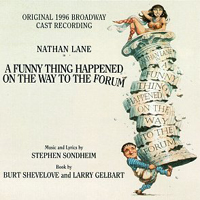 Broadway Cast, 1996 (Angel)
Broadway Cast, 1996 (Angel)  (3 / 5) This revival (revisal?) of …Forum offered new orchestrations by Jonathan Tunick, plus quite a few new lyrics by Sondheim, and other musical changes that were integral to the production. The entire “House of Marcus Lycus” sequence (not on the original cast album) is included and, while much of the dance music for the courtesans is new, the song itself has been preserved, performed by the always funny Ernie Sabella with musical assists from the ladies and connecting dialogue by Pseudolus (Nathan Lane) and Hero (Jim Stanek). Lane was the raison d’etre for this production; it was inevitable that he and the role of Pseudolus would eventually meet. The actor does not disappoint, making good on the character’s promise to “employ every device we know in our desire to divert you.” (He even recorded the tongue-twisting “Pretty Little Picture,” which was not actually performed in this production.) Conductor Edward Strauss keeps everything surging forward, allowing us just enough time to savor the details of words and music before hurtling ahead. The supporting cast is variable: Stanek and Jessica Boevers as Philia are on the dull side (the humor of their characters is hard to capture on a recording), but their singing is lovely. Although the shoes of Jack Gilford and David Burns are hard to fill, Mark Linn-Baker (Hysterium) and Lewis J. Stadlen (Senex) do their best. Cris Groenendaal’s Miles Gloriosus isn’t as funny as Ron Holgate’s original, but Mary Testa puts her own stamp on the role of Domina and delivers a smashing “That Dirty Old Man.” This is a highly enjoyable, energetic recording of a classic musical farce. — J.D.
(3 / 5) This revival (revisal?) of …Forum offered new orchestrations by Jonathan Tunick, plus quite a few new lyrics by Sondheim, and other musical changes that were integral to the production. The entire “House of Marcus Lycus” sequence (not on the original cast album) is included and, while much of the dance music for the courtesans is new, the song itself has been preserved, performed by the always funny Ernie Sabella with musical assists from the ladies and connecting dialogue by Pseudolus (Nathan Lane) and Hero (Jim Stanek). Lane was the raison d’etre for this production; it was inevitable that he and the role of Pseudolus would eventually meet. The actor does not disappoint, making good on the character’s promise to “employ every device we know in our desire to divert you.” (He even recorded the tongue-twisting “Pretty Little Picture,” which was not actually performed in this production.) Conductor Edward Strauss keeps everything surging forward, allowing us just enough time to savor the details of words and music before hurtling ahead. The supporting cast is variable: Stanek and Jessica Boevers as Philia are on the dull side (the humor of their characters is hard to capture on a recording), but their singing is lovely. Although the shoes of Jack Gilford and David Burns are hard to fill, Mark Linn-Baker (Hysterium) and Lewis J. Stadlen (Senex) do their best. Cris Groenendaal’s Miles Gloriosus isn’t as funny as Ron Holgate’s original, but Mary Testa puts her own stamp on the role of Domina and delivers a smashing “That Dirty Old Man.” This is a highly enjoyable, energetic recording of a classic musical farce. — J.D.
Funny Face
 New York and London Casts, 1927 and 1928 (Columbia, etc./Hallmark)
New York and London Casts, 1927 and 1928 (Columbia, etc./Hallmark)  (3 / 5) Purists who require the Gershwins’ Funny Face untainted by songs written by others have no choice but to brave these primitive recordings made by cast members of the original New York and London productions of 1927-28. The performances are pure gold from an archival standpoint. They offer the rare chance to hear Fred Astaire singing while he was still in his twenties, and there are also two priceless duets with his sister, Adele: “Funny Face” and “The Babbitt and the Bromide.” Two Arden-Ohman piano medleys serve as a prologue and entr’acte, and we have George Gershwin himself playing “My One and Only,” which Fred croons and taps on a separate track. Adele and Bernard Clifton get the love songs “He Loves and She Loves” and “‘S Wonderful.” Comedy is here too, as Leslie Henson performs “Tell the Doc.” If one can get past the imperfect sound and travel back to another era of performance style, there’s much pleasure to be found in this collection. — Morgan Sills
(3 / 5) Purists who require the Gershwins’ Funny Face untainted by songs written by others have no choice but to brave these primitive recordings made by cast members of the original New York and London productions of 1927-28. The performances are pure gold from an archival standpoint. They offer the rare chance to hear Fred Astaire singing while he was still in his twenties, and there are also two priceless duets with his sister, Adele: “Funny Face” and “The Babbitt and the Bromide.” Two Arden-Ohman piano medleys serve as a prologue and entr’acte, and we have George Gershwin himself playing “My One and Only,” which Fred croons and taps on a separate track. Adele and Bernard Clifton get the love songs “He Loves and She Loves” and “‘S Wonderful.” Comedy is here too, as Leslie Henson performs “Tell the Doc.” If one can get past the imperfect sound and travel back to another era of performance style, there’s much pleasure to be found in this collection. — Morgan Sills
 Film Soundtrack, 1956 (Verve)
Film Soundtrack, 1956 (Verve)  (5 / 5) One of the most fashionable films ever made is the classic Funny Face starring Fred Astaire, Audrey Hepburn, and Kay Thompson. Highlights from the score of the Gershwin brothers’ Broadway musical of the 1920s, in which Astaire had starred three decades earlier, are inserted into a new plot and augmented with a trio of up-tempo numbers by composer-producer Roger Edens and lyricist-screenwriter Leonard Gershe. We know that this is a terrific recording as soon as Astaire’s unmistakable voice launches into the title tune on the first track. Not much later, Thompson socks out the Edens-Gershe showstopper “Think Pink.” Hepburn offers a deeply felt, subtle reading of”How Long Has This Been Going On?” Astaire’s ballad “He Loves and She Loves” is given an equally uncluttered and sincere rendition. The soundtrack album also boasts some delightful duets: Thompson and Astaire’s “Clap Yo’ Hands” and Thompson and Hepburn’s “On How to Be Lovely.” Especially apparent without the film’s visuals to distract the eye is the brilliance of the writing/arranging in the star trio’s extended musical sequence “Bonjour Paris.” The songs have been fitted with perfect orchestrations by Alexander Courage, Conrad Salinger, Van Cleave, and Skip Martin, and the entire performance is crisply conducted by Adolph Deutsch. In the words of Ira Gershwin as heard in the recording’s final track, “‘S Wonderful! ‘S Marvelous!” — M.S.
(5 / 5) One of the most fashionable films ever made is the classic Funny Face starring Fred Astaire, Audrey Hepburn, and Kay Thompson. Highlights from the score of the Gershwin brothers’ Broadway musical of the 1920s, in which Astaire had starred three decades earlier, are inserted into a new plot and augmented with a trio of up-tempo numbers by composer-producer Roger Edens and lyricist-screenwriter Leonard Gershe. We know that this is a terrific recording as soon as Astaire’s unmistakable voice launches into the title tune on the first track. Not much later, Thompson socks out the Edens-Gershe showstopper “Think Pink.” Hepburn offers a deeply felt, subtle reading of”How Long Has This Been Going On?” Astaire’s ballad “He Loves and She Loves” is given an equally uncluttered and sincere rendition. The soundtrack album also boasts some delightful duets: Thompson and Astaire’s “Clap Yo’ Hands” and Thompson and Hepburn’s “On How to Be Lovely.” Especially apparent without the film’s visuals to distract the eye is the brilliance of the writing/arranging in the star trio’s extended musical sequence “Bonjour Paris.” The songs have been fitted with perfect orchestrations by Alexander Courage, Conrad Salinger, Van Cleave, and Skip Martin, and the entire performance is crisply conducted by Adolph Deutsch. In the words of Ira Gershwin as heard in the recording’s final track, “‘S Wonderful! ‘S Marvelous!” — M.S.
The Full Monty
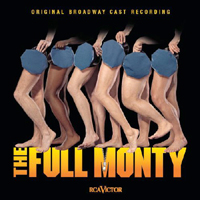 Original Broadway Cast, 2000 (BMG)
Original Broadway Cast, 2000 (BMG)  (4 / 5) A great pleasure of experiencing this show live was seeing how well Terrence McNally’s script melded with show-tune novice David Yazbek’s music and lyrics. Based on a hit film from England, The Full Monty concerns a group of unemployed guys who resort to stripping in a club to earn some dough. The property really needed a contemporary voice to make it believable as a musical — and, in Yazbek, that’s what it got. The pop-tinged songs sound effortless, the lyrics as natural as dialogue coming from the mouths of these working-class men and the women in their lives. Modern though the music sounds, Yazbek writes marvelously well along traditional musical theater lines, from the comically confessional “Scrap” (that’s what these laid-off steel workers feel like) to “Jeanette’s Showbiz Number,” sung with world-weary pizzazz by the great Kathleen Freeman. Irreverence abounds in André De Shields’s “Big Black Man” and in the show’s shining gem, “Big Ass Rock,” in which antihero Jerry (Patrick Wilson) and best-buddy Dave (John Ellison Conlee) use darkly humorous reverse psychology to talk a fellow worker and soon-to-be fellow stripper out of committing suicide. The show also has its poignant moments in “You Walk With Me” and “Breeze Off the River.” While the songs don’t pack the same punch here as they do onstage, this is still a great score to enjoy on recording. — Brooke Pierce
(4 / 5) A great pleasure of experiencing this show live was seeing how well Terrence McNally’s script melded with show-tune novice David Yazbek’s music and lyrics. Based on a hit film from England, The Full Monty concerns a group of unemployed guys who resort to stripping in a club to earn some dough. The property really needed a contemporary voice to make it believable as a musical — and, in Yazbek, that’s what it got. The pop-tinged songs sound effortless, the lyrics as natural as dialogue coming from the mouths of these working-class men and the women in their lives. Modern though the music sounds, Yazbek writes marvelously well along traditional musical theater lines, from the comically confessional “Scrap” (that’s what these laid-off steel workers feel like) to “Jeanette’s Showbiz Number,” sung with world-weary pizzazz by the great Kathleen Freeman. Irreverence abounds in André De Shields’s “Big Black Man” and in the show’s shining gem, “Big Ass Rock,” in which antihero Jerry (Patrick Wilson) and best-buddy Dave (John Ellison Conlee) use darkly humorous reverse psychology to talk a fellow worker and soon-to-be fellow stripper out of committing suicide. The show also has its poignant moments in “You Walk With Me” and “Breeze Off the River.” While the songs don’t pack the same punch here as they do onstage, this is still a great score to enjoy on recording. — Brooke Pierce
The Frogs
 Studio Cast, 2001 (Nonesuch)
Studio Cast, 2001 (Nonesuch)  (4 / 5) Based on a play by Aristophanes, The Frogs was written by Stephen Sondheim and Burt Shevelove to be performed by the Yale Repertory Theatre in the university’s swimming pool. It had a one-week run in 1974, with an ensemble that included three Yale School of Drama students who would be heard from again: Meryl Streep, Sigourney Weaver, and Christopher Durang. The show harkens back to the Sondheim-Shevelove-Larry Gelbart musical A Funny Thing Happened on the Way to the Forum in that both were freely based on ancient comic classics. This excellent recording of the brief score of The Frogs benefits from the luxury casting of Nathan Lane as the god Dionysos (“an aging juvenile of great charm”) and Brian Stokes Mitchell as his slave, Xanthias. The comic chemistry between these two is terrific, never more so than in the droll “Prologos: Invocation and Instructions to the Audience.” Dionysus begs the assembled theatergoers, “Please don’t cough / It tends to throw the actors off,” going on to make further requests: “Please refrain / From candy wrapped in cellophane,” and “Please, don’t fart — there’s very little air and this is art.” In the equally funny title song, the chorus alternates between froggy noises and witty self-assessment (“Frogs! / We’re the frogs / The adorable frogs! / Not your hoity-toity intellectuals / Not your hippy-dippy homosexuals”). A highlight of this world-premiere recording comes when Shakespeare shows up in the person of Davis Gaines to sing the beautiful ballad “Fear No More” — with a text by the Bard himself, from Cymbeline. The American Theatre Orchestra plays lovingly and excitingly under Paul Gemignani, and the state-of-the-art sound quality of the album is superb, the better to enjoy one of Sondheim’s shortest scores but also one of his freshest and most delightful. — Michael Portantiere
(4 / 5) Based on a play by Aristophanes, The Frogs was written by Stephen Sondheim and Burt Shevelove to be performed by the Yale Repertory Theatre in the university’s swimming pool. It had a one-week run in 1974, with an ensemble that included three Yale School of Drama students who would be heard from again: Meryl Streep, Sigourney Weaver, and Christopher Durang. The show harkens back to the Sondheim-Shevelove-Larry Gelbart musical A Funny Thing Happened on the Way to the Forum in that both were freely based on ancient comic classics. This excellent recording of the brief score of The Frogs benefits from the luxury casting of Nathan Lane as the god Dionysos (“an aging juvenile of great charm”) and Brian Stokes Mitchell as his slave, Xanthias. The comic chemistry between these two is terrific, never more so than in the droll “Prologos: Invocation and Instructions to the Audience.” Dionysus begs the assembled theatergoers, “Please don’t cough / It tends to throw the actors off,” going on to make further requests: “Please refrain / From candy wrapped in cellophane,” and “Please, don’t fart — there’s very little air and this is art.” In the equally funny title song, the chorus alternates between froggy noises and witty self-assessment (“Frogs! / We’re the frogs / The adorable frogs! / Not your hoity-toity intellectuals / Not your hippy-dippy homosexuals”). A highlight of this world-premiere recording comes when Shakespeare shows up in the person of Davis Gaines to sing the beautiful ballad “Fear No More” — with a text by the Bard himself, from Cymbeline. The American Theatre Orchestra plays lovingly and excitingly under Paul Gemignani, and the state-of-the-art sound quality of the album is superb, the better to enjoy one of Sondheim’s shortest scores but also one of his freshest and most delightful. — Michael Portantiere
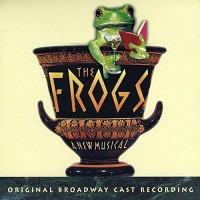 Original Broadway Cast, 2004 (PS Classics)
Original Broadway Cast, 2004 (PS Classics)  (4 / 5) A new version of The Frogs was presented by Lincoln Center Theater at the Vivian Beaumont in 2004 for a limited, three-month run, but the lack of an extension or commercial transfer for the production should not be taken as a measure of its quality, as there’s much to savor here. Nathan Lane starred in the show as Dionysos, bringing the full force of his presence and talents to a role he had previously recorded a few years earlier (see review above). One of Broadway’s biggest stars for the past several decades, but not previously known as a writer, Lane became so enamored of the Sondheim/Shevelove adaptation of Aristophanes’ play that he himself collaborated with Sondheim in crafting an extensively revised and expanded version; the full credits for the text and score of this production read, “A comedy written in 405 b.c. by Aristophanes; “The Frogs” freely adapted by Burt Shevelove; “The Frogs” even more freely adapted by Nathan Lane; music by Stephen Sondheim; lyrics by Stephen Sondheim; lyrics for “Fear No More” from Cymbeline by William Shakespeare.” Lane and Sondheim perhaps overwrote a bit in reworking the piece, but the great news here is that Sondheim composed some excellent new songs to augment the 1974 score. Arguably the best of them all is “I Love to Travel,” a number with a wonderfully old-time showbiz, almost vaudevillian feel to it, for Dionysos, Xanthias (a perfectly cast Roger Bart) and the Greek Chorus. In another style entirely, “Ariadne” is a lovely, elegiac new ballad for Dionysos about his deceased wife, affectingly rendered by Lane. PS Classics’ cast album of the show would be worth purchasing if only for those two items, but there are many other pleasures to be had in the performances of the new songs and those carried over from the original score, courtesy of Jonathan Tunick’s orchestrations, Paul Gemignani’s musical direction, and a strong cast that also includes Burke Moses as Herakles, John Byner as Charon/Aekos, Peter Bartlett as Pluto, and Daniel Davis as George Bernard Shaw. Finally, although Michael Siberry is nowhere near as vocally gifted as Davis Gaines, he does a more satisfying job with “Fear No More” in that his performance sounds simpler and fresher. — M.P.
(4 / 5) A new version of The Frogs was presented by Lincoln Center Theater at the Vivian Beaumont in 2004 for a limited, three-month run, but the lack of an extension or commercial transfer for the production should not be taken as a measure of its quality, as there’s much to savor here. Nathan Lane starred in the show as Dionysos, bringing the full force of his presence and talents to a role he had previously recorded a few years earlier (see review above). One of Broadway’s biggest stars for the past several decades, but not previously known as a writer, Lane became so enamored of the Sondheim/Shevelove adaptation of Aristophanes’ play that he himself collaborated with Sondheim in crafting an extensively revised and expanded version; the full credits for the text and score of this production read, “A comedy written in 405 b.c. by Aristophanes; “The Frogs” freely adapted by Burt Shevelove; “The Frogs” even more freely adapted by Nathan Lane; music by Stephen Sondheim; lyrics by Stephen Sondheim; lyrics for “Fear No More” from Cymbeline by William Shakespeare.” Lane and Sondheim perhaps overwrote a bit in reworking the piece, but the great news here is that Sondheim composed some excellent new songs to augment the 1974 score. Arguably the best of them all is “I Love to Travel,” a number with a wonderfully old-time showbiz, almost vaudevillian feel to it, for Dionysos, Xanthias (a perfectly cast Roger Bart) and the Greek Chorus. In another style entirely, “Ariadne” is a lovely, elegiac new ballad for Dionysos about his deceased wife, affectingly rendered by Lane. PS Classics’ cast album of the show would be worth purchasing if only for those two items, but there are many other pleasures to be had in the performances of the new songs and those carried over from the original score, courtesy of Jonathan Tunick’s orchestrations, Paul Gemignani’s musical direction, and a strong cast that also includes Burke Moses as Herakles, John Byner as Charon/Aekos, Peter Bartlett as Pluto, and Daniel Davis as George Bernard Shaw. Finally, although Michael Siberry is nowhere near as vocally gifted as Davis Gaines, he does a more satisfying job with “Fear No More” in that his performance sounds simpler and fresher. — M.P.
Foxy
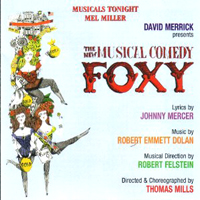 Off-Broadway Cast, 2002 (Original Cast Records)
Off-Broadway Cast, 2002 (Original Cast Records)  (2 / 5) Here was a wonderful idea for a musical: Bert Lahr in an adaptation of Volpone, with the action of that Ben Jonson classic moved to gold-rush Alaska. But the project was seemingly cursed from its inception. The creators of Foxy included the great lyricist Johnny Mercer; the wrong director, Robert Lewis; a constantly changing line-up of ineffective producers; and an inexperienced pair of book writers, Ring Lardner, Jr. and Ian McLellan Hunter, who refused to listen to Bert Lahr or pay attention to Jerome Robbins when he came in to help. The 1964 result was a ramshackle construction in which about half the score consisted of undramatic, shockingly trite numbers. But even when the ideas for the songs were poor, Mercer had great fun playing with words; and when the ideas were good, as in “Respectability,” “Many Ways to Skin a Cat,” “Money Isn’t Everything,” and “Bon Vivant,” he and composer Robert Emmett Dolan hit them out of the park. (“Bon Vivant” is a highlight, as the chorus serenades a fake English Lord with “Yoicks and zounds / And Elizabethan sounds / What a bon vivant is he!”) Unfortunately, this recording of the Musicals Tonight! staged concert presentation of the show falls short. John Flynn is much too sweet as the scheming Doc; Rudy Roberson, given the impossible task of following Bert Lahr, seems to have no comic chops at all; and the single-piano accompaniment is dull. (Note: Bruce Yeko’s private label S.P.M. released on LP a live recording of a performance by the Broadway cast, but it has sound problems. Box Office Records issued both an album titled Bert Lahr on Stage, Screen and Radio, which includes two very good, live Foxy tracks, and Johnny Mercer Sings, featuring a delightful 10-song demo of the score.) — David Wolf
(2 / 5) Here was a wonderful idea for a musical: Bert Lahr in an adaptation of Volpone, with the action of that Ben Jonson classic moved to gold-rush Alaska. But the project was seemingly cursed from its inception. The creators of Foxy included the great lyricist Johnny Mercer; the wrong director, Robert Lewis; a constantly changing line-up of ineffective producers; and an inexperienced pair of book writers, Ring Lardner, Jr. and Ian McLellan Hunter, who refused to listen to Bert Lahr or pay attention to Jerome Robbins when he came in to help. The 1964 result was a ramshackle construction in which about half the score consisted of undramatic, shockingly trite numbers. But even when the ideas for the songs were poor, Mercer had great fun playing with words; and when the ideas were good, as in “Respectability,” “Many Ways to Skin a Cat,” “Money Isn’t Everything,” and “Bon Vivant,” he and composer Robert Emmett Dolan hit them out of the park. (“Bon Vivant” is a highlight, as the chorus serenades a fake English Lord with “Yoicks and zounds / And Elizabethan sounds / What a bon vivant is he!”) Unfortunately, this recording of the Musicals Tonight! staged concert presentation of the show falls short. John Flynn is much too sweet as the scheming Doc; Rudy Roberson, given the impossible task of following Bert Lahr, seems to have no comic chops at all; and the single-piano accompaniment is dull. (Note: Bruce Yeko’s private label S.P.M. released on LP a live recording of a performance by the Broadway cast, but it has sound problems. Box Office Records issued both an album titled Bert Lahr on Stage, Screen and Radio, which includes two very good, live Foxy tracks, and Johnny Mercer Sings, featuring a delightful 10-song demo of the score.) — David Wolf
Fosse
 Original Broadway Cast, 1999 (RCA)
Original Broadway Cast, 1999 (RCA)  (3 / 5) Bob Fosse captured the revolutionary sexual politics of the 1960s and 1970s in a voluptuous mix of dance forms based on jazz, tap, and ballet. The show that bears his name traces, although not in chronological sequence, his choreographic career from The Pajama Game (1954) to Big Deal (1986). Fosse was conceived by co-directors Richard Maltby, Jr. and Ann Reinking, along with Chet Walker, who’s credited as having recreated the master’s choreography for the occasion. When the show arrived on Broadway from Toronto after tryouts in Boston and Los Angeles, it proved to be an eye-popping amalgam of ultra-fit Broadway dancers like Jane Lanier and Scott Wise, slick design elements by Santo Loquasto and Andrew Bridge, and amazing choreography overseen by Reinking, Walker, and “artistic advisor” Gwen Verdon. The show’s score is a compilation of numbers from theatrical and non-theatrical projects to which Fosse was attached, including a 1968 Bob Hope television special and the unsuccessful 1974 movie musical of Antoine de Saint-Exupery’s The Little Prince. The cast recording is highly enjoyable: The numbers, written by various composers and lyricists, create a clear sense of what the opening ensemble terms “Fosse’s World,” and the melodies, rhythms, and lyrics, lovingly recorded by record producer Jay David Saks and legendary A&R man Bill Rosenfield, stand admirably on their own as an aural counterpart to Fosse’s dance vocabulary. The vocal performances and a 21-person pit band, under the baton of musical director Patrick S. Brady, display the level of professionalism that distinguishes Broadway at its best from musical theater anywhere else in the world. The cast album is capped with a thrilling arrangement (over 13 minutes’ worth) of Louis Prima’s “Sing! Sing! Sing!”, seemingly all brass and percussion, that would still leave the listener wanting more at four times its length. — Charles Wright
(3 / 5) Bob Fosse captured the revolutionary sexual politics of the 1960s and 1970s in a voluptuous mix of dance forms based on jazz, tap, and ballet. The show that bears his name traces, although not in chronological sequence, his choreographic career from The Pajama Game (1954) to Big Deal (1986). Fosse was conceived by co-directors Richard Maltby, Jr. and Ann Reinking, along with Chet Walker, who’s credited as having recreated the master’s choreography for the occasion. When the show arrived on Broadway from Toronto after tryouts in Boston and Los Angeles, it proved to be an eye-popping amalgam of ultra-fit Broadway dancers like Jane Lanier and Scott Wise, slick design elements by Santo Loquasto and Andrew Bridge, and amazing choreography overseen by Reinking, Walker, and “artistic advisor” Gwen Verdon. The show’s score is a compilation of numbers from theatrical and non-theatrical projects to which Fosse was attached, including a 1968 Bob Hope television special and the unsuccessful 1974 movie musical of Antoine de Saint-Exupery’s The Little Prince. The cast recording is highly enjoyable: The numbers, written by various composers and lyricists, create a clear sense of what the opening ensemble terms “Fosse’s World,” and the melodies, rhythms, and lyrics, lovingly recorded by record producer Jay David Saks and legendary A&R man Bill Rosenfield, stand admirably on their own as an aural counterpart to Fosse’s dance vocabulary. The vocal performances and a 21-person pit band, under the baton of musical director Patrick S. Brady, display the level of professionalism that distinguishes Broadway at its best from musical theater anywhere else in the world. The cast album is capped with a thrilling arrangement (over 13 minutes’ worth) of Louis Prima’s “Sing! Sing! Sing!”, seemingly all brass and percussion, that would still leave the listener wanting more at four times its length. — Charles Wright
42nd Street
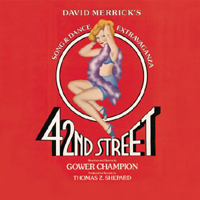 Original Broadway Cast, 1980 (RCA)
Original Broadway Cast, 1980 (RCA)  (2 / 5) This wasn’t the first Hollywood musical to be adapted to the stage, but its success established a trend that has reached well into the 21st century. Whether or not this trajectory is a good thing will always be a cause for argument. The Broadway incarnation of 42nd Street was the final work of Gower Champion, whose death was announced in a shocking and showman-like gesture by producer David Merrick immediately following the opening-night bows. Champion had transformed the movie into an enjoyable theatrical pageant with nonstop glitter, an occasional nod to Busby Berkeley, and very little of the film’s drive and desperation. Fueled by all that audience-grabbing spectacle and song, the production ran for years, but its manufactured nature is pretty obvious on the cast recording. The Harry Warren-AI Dubin score has been padded out with songs from other films, and the wonderful period sound of the original Warner Bros. orchestrations has been replaced with the expert playing of a punched-up pit band. Fortunately, there are some seasoned pros in the cast– Jerry Orbach, Tammy Grimes, Lee Roy Reams, and Carole Cook — to provide true musical theater resonance. In the role of Peggy Sawyer, the chorine-promoted-leading-lady who’s told “you’re going out there a youngster, but you’ve got to come back a star,” Wanda Richert is sweet and sings better than Ruby Keeler. (Of course, it can also be said that coyotes sing better than Ruby Keeler.) There are things to enjoy in this recording, even though we might wish that the gifted Champion had expended his final energies upon something more substantial. — Richard Barrios
(2 / 5) This wasn’t the first Hollywood musical to be adapted to the stage, but its success established a trend that has reached well into the 21st century. Whether or not this trajectory is a good thing will always be a cause for argument. The Broadway incarnation of 42nd Street was the final work of Gower Champion, whose death was announced in a shocking and showman-like gesture by producer David Merrick immediately following the opening-night bows. Champion had transformed the movie into an enjoyable theatrical pageant with nonstop glitter, an occasional nod to Busby Berkeley, and very little of the film’s drive and desperation. Fueled by all that audience-grabbing spectacle and song, the production ran for years, but its manufactured nature is pretty obvious on the cast recording. The Harry Warren-AI Dubin score has been padded out with songs from other films, and the wonderful period sound of the original Warner Bros. orchestrations has been replaced with the expert playing of a punched-up pit band. Fortunately, there are some seasoned pros in the cast– Jerry Orbach, Tammy Grimes, Lee Roy Reams, and Carole Cook — to provide true musical theater resonance. In the role of Peggy Sawyer, the chorine-promoted-leading-lady who’s told “you’re going out there a youngster, but you’ve got to come back a star,” Wanda Richert is sweet and sings better than Ruby Keeler. (Of course, it can also be said that coyotes sing better than Ruby Keeler.) There are things to enjoy in this recording, even though we might wish that the gifted Champion had expended his final energies upon something more substantial. — Richard Barrios
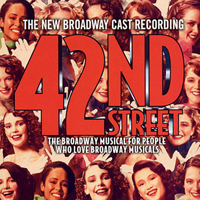 Broadway Cast, 2001 (Atlantic)
Broadway Cast, 2001 (Atlantic)  (1 / 5) Two decades after the original show was a smash, the revival did it all over again. Done in “tribute” to the original Champion staging (i.e., they stole the best parts), this 42nd Street was even more spiffed-up and brassy. There’s an intense air of overkill here, those relentless tapping feet even more threatening than in Busby Berkeley’s original “Lullaby of Broadway” number. “Shuffle Off to Buffalo,” in particular, is a vulgar nightmare, but several other cuts are also objectionable. Fortunately, a genuine star performance emerges from the excess: Christine Ebersole, who won a Tony for her work as the fading diva Dorothy Brock. Amid a herd of screechers and belters, Ebersole is the classy, real thing. For her trouble, she is rewarded (and rewards the listener) with an added song, “I Only Have Eyes for You.” Onstage, Michael Cumpsty seemed miscast in the Warner Baxter/Jerry Orbach role, and he sounds equally uncomfortable on the recording. As for Kate Levering, she serves up chilly efficiency in place of Ruby Keeler’s clunky charm. If you want modern-day Broadway brass, it’s here in spades; if you’re looking for something more, play the Ebersole tracks and then go out and rent the movie. — R.B.
(1 / 5) Two decades after the original show was a smash, the revival did it all over again. Done in “tribute” to the original Champion staging (i.e., they stole the best parts), this 42nd Street was even more spiffed-up and brassy. There’s an intense air of overkill here, those relentless tapping feet even more threatening than in Busby Berkeley’s original “Lullaby of Broadway” number. “Shuffle Off to Buffalo,” in particular, is a vulgar nightmare, but several other cuts are also objectionable. Fortunately, a genuine star performance emerges from the excess: Christine Ebersole, who won a Tony for her work as the fading diva Dorothy Brock. Amid a herd of screechers and belters, Ebersole is the classy, real thing. For her trouble, she is rewarded (and rewards the listener) with an added song, “I Only Have Eyes for You.” Onstage, Michael Cumpsty seemed miscast in the Warner Baxter/Jerry Orbach role, and he sounds equally uncomfortable on the recording. As for Kate Levering, she serves up chilly efficiency in place of Ruby Keeler’s clunky charm. If you want modern-day Broadway brass, it’s here in spades; if you’re looking for something more, play the Ebersole tracks and then go out and rent the movie. — R.B.
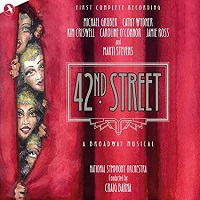 Studio Cast, 2022 (JAY, 2CDs)
Studio Cast, 2022 (JAY, 2CDs)  (2 / 5) In view of the fact that 42nd Street is a thoroughly retro Broadway show based on a very old, seminal, “backstage musical” movie, featuring songs taken from that flick and various others plus huge amounts of dance music, the property seems rather an odd choice for a complete score recording. This is one of several JAY releases that have had extraordinarily long gestation periods; according to notes on the company’s website, “JAY commenced the first complete recording of the original version of the musical with the original orchestrations by Philip J. Lang at Abbey Road Studios, London on October 5, 1996 and completed it at Clinton Recording Studios, New York on October 19, 1996. It was released on April 8, 2022.” There are enjoyable performances by Marti Stevens as Dorothy Brock, Cathy Wydner as Peggy Sawyer, and Kim Criswell as Maggie Jones. Michael Gruber, with his beautiful baritenor, sounds great in Billy Lawlor’s numbers, but as Julian Marsh, Jamie Ross lacks the vocal authority that Jerry Orbach brought to “Lullaby of Broadway” and the title song. The chorus sings very well, thankfully without British accents, and many listeners will enjoy hearing the National Symphony Orchestra, conducted by Craig Barna, playing this music — especially the bigger and brassier pieces, such as the overture. In common with JAY’s other musical theater recordings, the sound quality and mixing here are superb, and Wydner as Peggy deserves a nod for supplying some nifty solo tap sounds. — Michael Portantiere
(2 / 5) In view of the fact that 42nd Street is a thoroughly retro Broadway show based on a very old, seminal, “backstage musical” movie, featuring songs taken from that flick and various others plus huge amounts of dance music, the property seems rather an odd choice for a complete score recording. This is one of several JAY releases that have had extraordinarily long gestation periods; according to notes on the company’s website, “JAY commenced the first complete recording of the original version of the musical with the original orchestrations by Philip J. Lang at Abbey Road Studios, London on October 5, 1996 and completed it at Clinton Recording Studios, New York on October 19, 1996. It was released on April 8, 2022.” There are enjoyable performances by Marti Stevens as Dorothy Brock, Cathy Wydner as Peggy Sawyer, and Kim Criswell as Maggie Jones. Michael Gruber, with his beautiful baritenor, sounds great in Billy Lawlor’s numbers, but as Julian Marsh, Jamie Ross lacks the vocal authority that Jerry Orbach brought to “Lullaby of Broadway” and the title song. The chorus sings very well, thankfully without British accents, and many listeners will enjoy hearing the National Symphony Orchestra, conducted by Craig Barna, playing this music — especially the bigger and brassier pieces, such as the overture. In common with JAY’s other musical theater recordings, the sound quality and mixing here are superb, and Wydner as Peggy deserves a nod for supplying some nifty solo tap sounds. — Michael Portantiere
Forever Plaid
 Original Off-Broadway Cast, 1990 (RCA)
Original Off-Broadway Cast, 1990 (RCA)  (4 / 5) In its New York incarnation, Steve Ross’s “Heavenly Musical Hit” Forever Plaid was, if you’ll pardon the expression, a divine tribute to the close-harmony-group singing of the Brill Building-era. The book is about a “guy group,” the Plaids, whose four members perished in a car crash on their way to pick up custom-tailored plaid tuxes for a gig that should have been their first big break. The date was February 9, 1964, and the Plaids were slammed broadside by a school bus filled with Catholic teens bound for Manhattan to join the studio audience for the Beatles’ debut on The Ed Sullivan Show. Now, “through the power of harmony and the expanding holes in the ozone layer in conjunction with the positions of the planets and all that astro-technical stuff,” the deceased Plaids have returned to perform the big show they never got to do. Forever Plaid ran on the Upper West Side for years. Under the direction of creator Ross, who also choreographed, the show’s original cast — Stan Chandler (tenor), David Engel (bass), Jason Graae (baritone), and Guy Stroman (tenor) — was wonderful. The recording was produced by the show’s musical director, James Raitt, with Bill Rosenfield supervising for the label; it captures the performers’ unimpeachable intonation, as well as their verve and comedic flair. The show is a rare combination of wit, hokum, double entendres, and assured musical taste, and in the hands of the original ensemble, it was even touching. The medleys combining “Gotta Be This or That” with “Undecided” (featuring Graae) and “Shangri-La” with “Rags to Riches” (featuring Engel) are standouts, but there’s not a dud track on the disc, which also includes what is surely the most clever, delicious rendition of the Hoagy Carmichael-Frank Loesser chestnut “Heart and Soul” (here featuring Stroman) ever heard. During the 1990s, Forever Plaid became a fixture in several major cities and toured the hinterlands, providing employment to an army of young Equity actors. This cast album is a wonderful souvenir of the original Off-Broadway company. — Charles Wright
(4 / 5) In its New York incarnation, Steve Ross’s “Heavenly Musical Hit” Forever Plaid was, if you’ll pardon the expression, a divine tribute to the close-harmony-group singing of the Brill Building-era. The book is about a “guy group,” the Plaids, whose four members perished in a car crash on their way to pick up custom-tailored plaid tuxes for a gig that should have been their first big break. The date was February 9, 1964, and the Plaids were slammed broadside by a school bus filled with Catholic teens bound for Manhattan to join the studio audience for the Beatles’ debut on The Ed Sullivan Show. Now, “through the power of harmony and the expanding holes in the ozone layer in conjunction with the positions of the planets and all that astro-technical stuff,” the deceased Plaids have returned to perform the big show they never got to do. Forever Plaid ran on the Upper West Side for years. Under the direction of creator Ross, who also choreographed, the show’s original cast — Stan Chandler (tenor), David Engel (bass), Jason Graae (baritone), and Guy Stroman (tenor) — was wonderful. The recording was produced by the show’s musical director, James Raitt, with Bill Rosenfield supervising for the label; it captures the performers’ unimpeachable intonation, as well as their verve and comedic flair. The show is a rare combination of wit, hokum, double entendres, and assured musical taste, and in the hands of the original ensemble, it was even touching. The medleys combining “Gotta Be This or That” with “Undecided” (featuring Graae) and “Shangri-La” with “Rags to Riches” (featuring Engel) are standouts, but there’s not a dud track on the disc, which also includes what is surely the most clever, delicious rendition of the Hoagy Carmichael-Frank Loesser chestnut “Heart and Soul” (here featuring Stroman) ever heard. During the 1990s, Forever Plaid became a fixture in several major cities and toured the hinterlands, providing employment to an army of young Equity actors. This cast album is a wonderful souvenir of the original Off-Broadway company. — Charles Wright
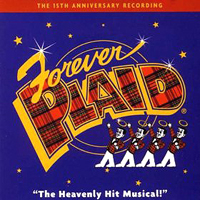 Las Vegas Cast, 2005 (DRG)
Las Vegas Cast, 2005 (DRG)  (4 / 5) Steve Ross’s feather-light revue may be more than a quarter century old, but its selection of mid-century pop songs is forever fresh. If the show’s narrative conceit isn’t also evergreen, that’s likely because subsequent revues have attempted to conjure the Plaid magic and fallen short. (The Marvelous Wonderettes comes immediately to mind, because of the misbegotten 2016 Off-Broadway revival.) Ross is famously proprietary about his franchise, and he has wisely ensured that each iteration of the Plaids — even the Christmas version — is faithful in form and execution to the original. The Las Vegas production preserved on this recording, the second Vegas run of the show, opened in February 2005 and played the Gold Coast Hotel & Casino for two years. The cast consists of Bruce Ewing (Jinx), Doug Frank (Smudge), Mark Perkins (Frankie), and Dale Sandish (Sparky), with J. Gregory Davis as the alternate for Frankie, Smudge, and Sparky. All five men perform on the recording. Admirably precise in intonation and harmony, they replicate the exuberance and naïve charm of the four pros who originated the roles in New York, although in appearance they’re more — umm, how to say it? — mature than their predecessors. David Kanscar on piano and Ken Seiffert on bass make a glorious noise to accompany and complement the fine vocals. As conductor, Kanscar maintains the style, tempi, and dynamics of James Raitt’s expert 1990 musical direction. Produced by Hugh Fordin and Richard Martini, the recording is effectively mixed and features superb aural quality. If a second Forever Plaid is essential for only the most comprehensive collections, the Las Vegas cast recording is a fine alternate for the original. Let’s rejoice that what’s been plaid in Vegas doesn’t have to stay in Vegas! — C.W.
(4 / 5) Steve Ross’s feather-light revue may be more than a quarter century old, but its selection of mid-century pop songs is forever fresh. If the show’s narrative conceit isn’t also evergreen, that’s likely because subsequent revues have attempted to conjure the Plaid magic and fallen short. (The Marvelous Wonderettes comes immediately to mind, because of the misbegotten 2016 Off-Broadway revival.) Ross is famously proprietary about his franchise, and he has wisely ensured that each iteration of the Plaids — even the Christmas version — is faithful in form and execution to the original. The Las Vegas production preserved on this recording, the second Vegas run of the show, opened in February 2005 and played the Gold Coast Hotel & Casino for two years. The cast consists of Bruce Ewing (Jinx), Doug Frank (Smudge), Mark Perkins (Frankie), and Dale Sandish (Sparky), with J. Gregory Davis as the alternate for Frankie, Smudge, and Sparky. All five men perform on the recording. Admirably precise in intonation and harmony, they replicate the exuberance and naïve charm of the four pros who originated the roles in New York, although in appearance they’re more — umm, how to say it? — mature than their predecessors. David Kanscar on piano and Ken Seiffert on bass make a glorious noise to accompany and complement the fine vocals. As conductor, Kanscar maintains the style, tempi, and dynamics of James Raitt’s expert 1990 musical direction. Produced by Hugh Fordin and Richard Martini, the recording is effectively mixed and features superb aural quality. If a second Forever Plaid is essential for only the most comprehensive collections, the Las Vegas cast recording is a fine alternate for the original. Let’s rejoice that what’s been plaid in Vegas doesn’t have to stay in Vegas! — C.W.
Footloose
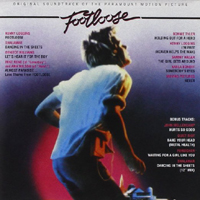 Film Soundtrack, 1984 (Columbia/Legacy)
Film Soundtrack, 1984 (Columbia/Legacy)  (3 / 5) Directed by Herbert Ross, with a screenplay by Dean Pitchford, Footloose is about some small-town teenagers who attack a municipal ordinance and do battle with a fundamentalist pastor in an effort to have dancing allowed at their high-school prom. (The plot was inspired by a controversy in Elmore City, Oklahoma, where the 1980 repeal of an anti-dancing law led to the town’s first sock hop in over 100a hundred years.) The film has a superb cast: Kevin Bacon as a big-city kid transplanted to a no-dancing hamlet; Lori Singer as his love interest; John Lithgow as the pinheaded preacher; and Dianne Wiest, Sarah Jessica Parker, and Chris Penn in supporting roles. Pitchford, an accomplished rock lyricist, enlisted Kenny Loggins and several others to collaborate on and perform songs for the movie’s soundtrack. Those songs include Loggins’ rendition of the title number and “I’m Free (Heaven Helps the Man),” Mike Reno and Ann Wilson doing Eric Carmen’s “Almost Paradise,” Deneice Williams singing Tom Snow’s “Let’s Hear It for the Boy,” Karla Bonoff’s rendition of “Sornebody’s Eyes,” Shalamar’s “Dancing in the Sheets,” Sammy Hagar’s “The Girl Gets Around,” Moving Pictures’ “Never,” and Bonnie Tyler’s delicious “Holding Out for a Hero.” The “remastered and enhanced” CD offers four bonus tracks: John Mellencamp’s “Hurts So Good,” Foreigner’s “Waiting for a Girl Like You,” Quiet Riot’s “Bang Your Head,” and a remix of Shalamar’s “Dancing in the Sheets.” — Charles Wright
(3 / 5) Directed by Herbert Ross, with a screenplay by Dean Pitchford, Footloose is about some small-town teenagers who attack a municipal ordinance and do battle with a fundamentalist pastor in an effort to have dancing allowed at their high-school prom. (The plot was inspired by a controversy in Elmore City, Oklahoma, where the 1980 repeal of an anti-dancing law led to the town’s first sock hop in over 100a hundred years.) The film has a superb cast: Kevin Bacon as a big-city kid transplanted to a no-dancing hamlet; Lori Singer as his love interest; John Lithgow as the pinheaded preacher; and Dianne Wiest, Sarah Jessica Parker, and Chris Penn in supporting roles. Pitchford, an accomplished rock lyricist, enlisted Kenny Loggins and several others to collaborate on and perform songs for the movie’s soundtrack. Those songs include Loggins’ rendition of the title number and “I’m Free (Heaven Helps the Man),” Mike Reno and Ann Wilson doing Eric Carmen’s “Almost Paradise,” Deneice Williams singing Tom Snow’s “Let’s Hear It for the Boy,” Karla Bonoff’s rendition of “Sornebody’s Eyes,” Shalamar’s “Dancing in the Sheets,” Sammy Hagar’s “The Girl Gets Around,” Moving Pictures’ “Never,” and Bonnie Tyler’s delicious “Holding Out for a Hero.” The “remastered and enhanced” CD offers four bonus tracks: John Mellencamp’s “Hurts So Good,” Foreigner’s “Waiting for a Girl Like You,” Quiet Riot’s “Bang Your Head,” and a remix of Shalamar’s “Dancing in the Sheets.” — Charles Wright
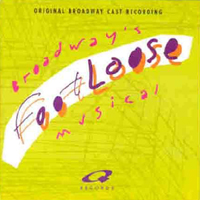 Original Broadway Cast, 1998 (Q Records)
Original Broadway Cast, 1998 (Q Records)  (1 / 5) When Footloose was adapted as a stage musical, it turned out that the movie’s vintage rock songs, wonderful as they may be, were too closely identified with the performers on the film soundtrack to seem anything but odd in the hands of show-music veterans like Dee Hoty and Broadway babies like Jeremy Kushnier and Jennifer Laura Thompson. Even if their idiom weren’t foreign to this context, the songs from the film, as compared with the ones that Pitchford and Tom Snow wrote expressly for the stage version, are shoehorned, rather than integrated, into the action. On this original cast recording, the really good songs — that is, the ones from the movie — aren’t given their due, and the additional numbers don’t live up to what’s on the soundtrack. — C.W.
(1 / 5) When Footloose was adapted as a stage musical, it turned out that the movie’s vintage rock songs, wonderful as they may be, were too closely identified with the performers on the film soundtrack to seem anything but odd in the hands of show-music veterans like Dee Hoty and Broadway babies like Jeremy Kushnier and Jennifer Laura Thompson. Even if their idiom weren’t foreign to this context, the songs from the film, as compared with the ones that Pitchford and Tom Snow wrote expressly for the stage version, are shoehorned, rather than integrated, into the action. On this original cast recording, the really good songs — that is, the ones from the movie — aren’t given their due, and the additional numbers don’t live up to what’s on the soundtrack. — C.W.
Follies
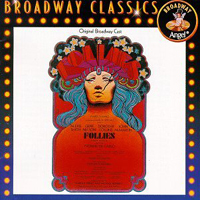 Original Broadway Cast, 1971 (Capitol/Angel/Kritzerland)
Original Broadway Cast, 1971 (Capitol/Angel/Kritzerland)  (4 / 5) To many, Follies is one of the greatest of all shows, possibly the ultimate musical theater piece. Others find it cultishly “interesting,” with a magnificent Stephen Sondheim score compromised by a problematic book. And some, especially those seeking “pure entertainment,” cannot grasp the show’s then-and-now, fact-and-fantasy structure or the juxtaposition of clever pastiche songs with those emanating from four unhappy people. In short, Follies will always be controversial, but those who love it do so with the fiercest devotion. One aspect of the show’s legend that is not open to dispute is that its original cast album is ultimately a pale (if frequently wonderful) reflection of a legendary production. All the great performers are here — Alexis Smith, Dorothy Collins, Gene Nelson, Yvonne De Carlo, Mary McCarty, and the rest — but the decision to edit this lengthy score to fit it on one LP disc was penny-wise and posterity-foolish. On the startling list of total omissions are “Loveland,” “Rain on the Roof,” and nearly all of the show’s dance music. (“One More Kiss,” originally left off the LP, was reinstated for the CD.) Furthermore, many of the songs that are here have damaging internal edits. What is present here is very fine and irreplaceable, including Collins’ aching “Losing My Mind” and De Carlo’s gutsy ”I’m Still Here,” even if both of these songs were among those cut down for the recording. Still, this condensed version of one of the most varied and intelligent scores in Broadway history allows precious little of the flavor of the original Harold Prince-Michael Bennett production to come through. (Note: The Kritzerland CD is a limited edition, remixed and remastered version of the original recording.) — Richard Barrios
(4 / 5) To many, Follies is one of the greatest of all shows, possibly the ultimate musical theater piece. Others find it cultishly “interesting,” with a magnificent Stephen Sondheim score compromised by a problematic book. And some, especially those seeking “pure entertainment,” cannot grasp the show’s then-and-now, fact-and-fantasy structure or the juxtaposition of clever pastiche songs with those emanating from four unhappy people. In short, Follies will always be controversial, but those who love it do so with the fiercest devotion. One aspect of the show’s legend that is not open to dispute is that its original cast album is ultimately a pale (if frequently wonderful) reflection of a legendary production. All the great performers are here — Alexis Smith, Dorothy Collins, Gene Nelson, Yvonne De Carlo, Mary McCarty, and the rest — but the decision to edit this lengthy score to fit it on one LP disc was penny-wise and posterity-foolish. On the startling list of total omissions are “Loveland,” “Rain on the Roof,” and nearly all of the show’s dance music. (“One More Kiss,” originally left off the LP, was reinstated for the CD.) Furthermore, many of the songs that are here have damaging internal edits. What is present here is very fine and irreplaceable, including Collins’ aching “Losing My Mind” and De Carlo’s gutsy ”I’m Still Here,” even if both of these songs were among those cut down for the recording. Still, this condensed version of one of the most varied and intelligent scores in Broadway history allows precious little of the flavor of the original Harold Prince-Michael Bennett production to come through. (Note: The Kritzerland CD is a limited edition, remixed and remastered version of the original recording.) — Richard Barrios
 New York Concert Cast, 1985 (RCA, 2CDs)
New York Concert Cast, 1985 (RCA, 2CDs)  (4 / 5) This concert production at Lincoln Center featured an all-star cast, and the results were dazzling if not perfect. All of the show’s strengths are clear in this nearly complete recording of the Follies score, but there are so many opportunities for big moments by stellar performers that it takes some doing to keep everything in balance. In fact, the balance is decidedly off when Elaine Stritch makes “Broadway Baby” into a weird, disenchanted cousin to “The Ladies Who Lunch.” More in line with the overall concept is a sweet memento from Betty Comden and Adolph Green, who chirp “Rain on the Roof, ” and a grand memento of operatic glories past is diva Licia Albanese in “One More Kiss.”(She’s beautifully paired with the clear-voiced Erie Mills.) Phyllis Newman as Stella is no match for Mary McCarty, nor does Carol Burnett, good as she is, offer a more definitive “I’m Still Here” than Yvonne De Carlo’s original. But Barbara Cook is up to the Dorothy Collins standard; not surprisingly, “Losing My Mind” is one of the highlights of the disc. Lee Remick is engaging as Phyllis, and George Hearn does well as Ben. In the role of Buddy, Mandy Patinkin offers his strange combination of fine singing and irritating self-indulgence. Everyone else delivers the goods acceptably, and the orchestra is no less than the New York Philharmonic, conducted splendidly by Paul Gemignani. — R.B.
(4 / 5) This concert production at Lincoln Center featured an all-star cast, and the results were dazzling if not perfect. All of the show’s strengths are clear in this nearly complete recording of the Follies score, but there are so many opportunities for big moments by stellar performers that it takes some doing to keep everything in balance. In fact, the balance is decidedly off when Elaine Stritch makes “Broadway Baby” into a weird, disenchanted cousin to “The Ladies Who Lunch.” More in line with the overall concept is a sweet memento from Betty Comden and Adolph Green, who chirp “Rain on the Roof, ” and a grand memento of operatic glories past is diva Licia Albanese in “One More Kiss.”(She’s beautifully paired with the clear-voiced Erie Mills.) Phyllis Newman as Stella is no match for Mary McCarty, nor does Carol Burnett, good as she is, offer a more definitive “I’m Still Here” than Yvonne De Carlo’s original. But Barbara Cook is up to the Dorothy Collins standard; not surprisingly, “Losing My Mind” is one of the highlights of the disc. Lee Remick is engaging as Phyllis, and George Hearn does well as Ben. In the role of Buddy, Mandy Patinkin offers his strange combination of fine singing and irritating self-indulgence. Everyone else delivers the goods acceptably, and the orchestra is no less than the New York Philharmonic, conducted splendidly by Paul Gemignani. — R.B.
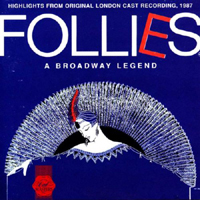 Original London Cast, 1987 (First Night, 2CDs)
Original London Cast, 1987 (First Night, 2CDs)  (4 / 5) Sondheim made considerable alterations to the score for this production. The Prelude and “Bolero d’Amour” were cut, “The Story of Lucy and Jessie” was replaced by an “intellectual striptease” called “Ah, But Underneath,” “The Road You Didn’t Take” was dropped in favor of the intricate Ben/Phyllis duet “Country House,” there was an entirely different “Loveland,” and Ben’s “Live, Laugh, Love” became his exhortation to “Make the Most of Your Music.” As for the leading performers: Diana Rigg is a predictably strong Phyllis, Julia McKenzie is a moving Sally, David Healy does fine as Buddy, and Daniel Massey is solid as Ben. Some of the featured roles are cast with the resonance necessary to any production of Follies; Dolores Gray sings ”I’m Still Here” with much of her plush vocal tone intact, and operetta veteran Adele Leigh quavers her way poignantly through “One More Kiss.” A few of the others struggle too hard to sound American, and the show as a whole seems a little reserved and earthbound. British reticence? Perhaps. At any rate, an ideal Follies may reside only in the minds of those who adore the show. — R.B.
(4 / 5) Sondheim made considerable alterations to the score for this production. The Prelude and “Bolero d’Amour” were cut, “The Story of Lucy and Jessie” was replaced by an “intellectual striptease” called “Ah, But Underneath,” “The Road You Didn’t Take” was dropped in favor of the intricate Ben/Phyllis duet “Country House,” there was an entirely different “Loveland,” and Ben’s “Live, Laugh, Love” became his exhortation to “Make the Most of Your Music.” As for the leading performers: Diana Rigg is a predictably strong Phyllis, Julia McKenzie is a moving Sally, David Healy does fine as Buddy, and Daniel Massey is solid as Ben. Some of the featured roles are cast with the resonance necessary to any production of Follies; Dolores Gray sings ”I’m Still Here” with much of her plush vocal tone intact, and operetta veteran Adele Leigh quavers her way poignantly through “One More Kiss.” A few of the others struggle too hard to sound American, and the show as a whole seems a little reserved and earthbound. British reticence? Perhaps. At any rate, an ideal Follies may reside only in the minds of those who adore the show. — R.B.
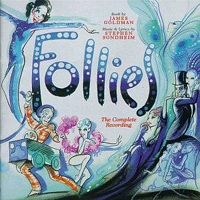 Paper Mill Playhouse Cast, 1998 (TVT, 2CDs)
Paper Mill Playhouse Cast, 1998 (TVT, 2CDs)  (4 / 5) As production costs skyrocketed in the 1990s, a full-scale Broadway revival of Follies seemed an ever decreasing possibility. But the Paper Mill Playhouse, a 45-minutes-from-Broadway theater in Millburn, N.J., mounted a well-received production in 1998. The design values were impressive, and the casting was rich, imaginative, and crammed with Broadway/Hollywood talent: Kaye Ballard, Eddie Bracken, Laurence Guittard, Dee Hoty, Donna McKechnie, Ann Miller, Lilane Montevecchi, Phyllis Newman, Tony Roberts, and Donald Saddler. Some aspects of this revival were certainly arresting. Who, after all, was more qualified to sing “I’m Still Here” than Ann Miller, well into her seventies but still going strong? Who was a more apt “Broadway Baby” than Kaye Ballard? Who could be a more winsome Sally than A Chorus Line sweetheart Donna McKechnie? If not all of this two-CD set lives up to the highlights offered by those performers, it’s good enough to use an example of the ongoing truth that every recording of Follies is fascinating and absolutely necessary in its own way. One caveat about this one: It’s labeled “The Complete Recording,” and an appendix section does offer a wonderful array of songs written for but not included in the original production (plus “The Story of Lucy and Jessie,” which was dropped for the Paper Mill production in favor of “Ah, But Underneath”). But since most of the numbers created for the London version are not here, it isn’t truly complete. Still, why carp? The cast ranges from competent to magnificent, the atmosphere is theatrically solid, and the resonant acoustic is gracious to some of the older singers. — R.B.
(4 / 5) As production costs skyrocketed in the 1990s, a full-scale Broadway revival of Follies seemed an ever decreasing possibility. But the Paper Mill Playhouse, a 45-minutes-from-Broadway theater in Millburn, N.J., mounted a well-received production in 1998. The design values were impressive, and the casting was rich, imaginative, and crammed with Broadway/Hollywood talent: Kaye Ballard, Eddie Bracken, Laurence Guittard, Dee Hoty, Donna McKechnie, Ann Miller, Lilane Montevecchi, Phyllis Newman, Tony Roberts, and Donald Saddler. Some aspects of this revival were certainly arresting. Who, after all, was more qualified to sing “I’m Still Here” than Ann Miller, well into her seventies but still going strong? Who was a more apt “Broadway Baby” than Kaye Ballard? Who could be a more winsome Sally than A Chorus Line sweetheart Donna McKechnie? If not all of this two-CD set lives up to the highlights offered by those performers, it’s good enough to use an example of the ongoing truth that every recording of Follies is fascinating and absolutely necessary in its own way. One caveat about this one: It’s labeled “The Complete Recording,” and an appendix section does offer a wonderful array of songs written for but not included in the original production (plus “The Story of Lucy and Jessie,” which was dropped for the Paper Mill production in favor of “Ah, But Underneath”). But since most of the numbers created for the London version are not here, it isn’t truly complete. Still, why carp? The cast ranges from competent to magnificent, the atmosphere is theatrically solid, and the resonant acoustic is gracious to some of the older singers. — R.B.
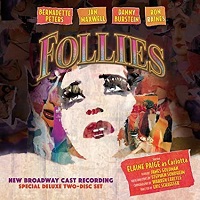 Broadway Cast, 2011 (PS Classics, 2 CDs)
Broadway Cast, 2011 (PS Classics, 2 CDs)  (4 / 5) The success of the Paper Mill Playhouse production played a sizable role in convincing Broadway that a Follies revival was, in fact, feasible. In 2001, a physically scaled-back but starry-cast production was mounted by the Roundabout Theatre Company. It did not earn a commercial recording, and nor did the well-received 2007 Encores! series presentation of the show. But the Follies discography did begin to expand again with the next Broadway production, which originated at the Kennedy Center in Washington D.C. and moved (with a few cast changes) to New York for a limited run. The acclaim that greeted this production was almost drowned out by some hand-wringing over one controversial piece of casting: Bernadette Peters as Sally. Indeed, as the recording indicates, the vulnerability that has always been part of the Peters persona may not always match up with that of the crestfallen Sally, reminding us that not every wonderful performer can be a complete success in every great role. In contrast, the late, Tony-winning Jan Maxwell makes a crisp, perfectly realized Phyllis, and Danny Burstein is an outstanding Buddy. Ron Raines is satisfactory as Ben, and the various cameos are, in general, highly successful. Elaine Paige has no difficulty delivering a powerhouse “I’m Still Here,” Jayne Houdyshell is an endearing Hattie, and as Emily Whitman, Susan Watson is still a charmer more than half a century after Bye, Bye Birdie. Two outstanding turns rate special mention: Terri White’s boffo “Who’s That Woman?” is a track one can happily play over and over, and veteran Met mezzo Rosalind Elias delivers a “One More Kiss” so firm as to make a listener wonder if she’s playing the old Heidi or the young one. (That latter role is beautifully sung by Leah Horowitz.) The recording generously extends over two discs and includes ample dialog. Once again, Follies casts its riveting, too-great-to-be-perfect yet mesmerizing spell. — R.B.
(4 / 5) The success of the Paper Mill Playhouse production played a sizable role in convincing Broadway that a Follies revival was, in fact, feasible. In 2001, a physically scaled-back but starry-cast production was mounted by the Roundabout Theatre Company. It did not earn a commercial recording, and nor did the well-received 2007 Encores! series presentation of the show. But the Follies discography did begin to expand again with the next Broadway production, which originated at the Kennedy Center in Washington D.C. and moved (with a few cast changes) to New York for a limited run. The acclaim that greeted this production was almost drowned out by some hand-wringing over one controversial piece of casting: Bernadette Peters as Sally. Indeed, as the recording indicates, the vulnerability that has always been part of the Peters persona may not always match up with that of the crestfallen Sally, reminding us that not every wonderful performer can be a complete success in every great role. In contrast, the late, Tony-winning Jan Maxwell makes a crisp, perfectly realized Phyllis, and Danny Burstein is an outstanding Buddy. Ron Raines is satisfactory as Ben, and the various cameos are, in general, highly successful. Elaine Paige has no difficulty delivering a powerhouse “I’m Still Here,” Jayne Houdyshell is an endearing Hattie, and as Emily Whitman, Susan Watson is still a charmer more than half a century after Bye, Bye Birdie. Two outstanding turns rate special mention: Terri White’s boffo “Who’s That Woman?” is a track one can happily play over and over, and veteran Met mezzo Rosalind Elias delivers a “One More Kiss” so firm as to make a listener wonder if she’s playing the old Heidi or the young one. (That latter role is beautifully sung by Leah Horowitz.) The recording generously extends over two discs and includes ample dialog. Once again, Follies casts its riveting, too-great-to-be-perfect yet mesmerizing spell. — R.B.
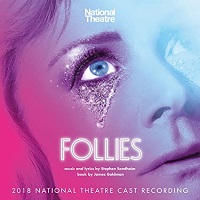 National Theatre Cast, 2018 (Arts Music)
National Theatre Cast, 2018 (Arts Music)  (4 / 5) Now well into the fifth decade of its existence, Follies came back yet again in a lavish, imaginative, and rapturously-received production at London’s National Theater. This is not only the latest major production of the show (at this writing) but is also one of the most widely seen, courtesy of broadcasts in movie theaters. Visually stunning and dramatically penetrating, the NT Follies fares a little less well as a purely auditory experience. Part of the problem comes, once again, with those Brits-striving-to-sound-American inflections. As with the first London recording, only more so, the cast members on this recording work rather conspicuously to convince listeners that they’re as American as, say, Ethel Shutta. The strain, as exacerbated by those intricate Sondheim lyrics, is detectable. Nor, to many listeners, will the entirely competent cast always seem as vocally distinctive as many of their predecessors. Under the direction of Dominick Cooke, the brilliant Imelda Staunton offers a take on the role of Sally that may not be appreciated by everyone but is certainly valid and striking. The other members of the central quartet are all fine, the “turns” are well done, and Tracie Bennett is an insightful Carlotta. There’s also a glimpse of “star glow” in the casting of long-ago movie hunk Gary Raymond as Weismann and opera diva Josephine Barstow as Heidi. In this Follies, the whole matters more than the individual parts, which is as worthy a concept as any bestowed on this iridescent, endlessly meaningful work of art. — R.B.
(4 / 5) Now well into the fifth decade of its existence, Follies came back yet again in a lavish, imaginative, and rapturously-received production at London’s National Theater. This is not only the latest major production of the show (at this writing) but is also one of the most widely seen, courtesy of broadcasts in movie theaters. Visually stunning and dramatically penetrating, the NT Follies fares a little less well as a purely auditory experience. Part of the problem comes, once again, with those Brits-striving-to-sound-American inflections. As with the first London recording, only more so, the cast members on this recording work rather conspicuously to convince listeners that they’re as American as, say, Ethel Shutta. The strain, as exacerbated by those intricate Sondheim lyrics, is detectable. Nor, to many listeners, will the entirely competent cast always seem as vocally distinctive as many of their predecessors. Under the direction of Dominick Cooke, the brilliant Imelda Staunton offers a take on the role of Sally that may not be appreciated by everyone but is certainly valid and striking. The other members of the central quartet are all fine, the “turns” are well done, and Tracie Bennett is an insightful Carlotta. There’s also a glimpse of “star glow” in the casting of long-ago movie hunk Gary Raymond as Weismann and opera diva Josephine Barstow as Heidi. In this Follies, the whole matters more than the individual parts, which is as worthy a concept as any bestowed on this iridescent, endlessly meaningful work of art. — R.B.
Fly With Me
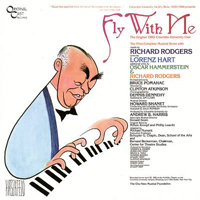 Columbia University Cast, 1980 (Original Cast Records)
Columbia University Cast, 1980 (Original Cast Records)  (3 / 5) It’s like dredging up riches from the Titanic: An unknown Rodgers and Hart score, their Columbia University varsity show from 1920, delivered intact. And the 17-year-old Richard Rodgers and 25-year-old Lorenz Hart are already their inimitable selves. Here’s Rodgers’ famous “wrong note” trick snuck into “Dreaming True,” thereby enhancing an already fine waltz. Here’s Hart rhyming extravagantly (“ecclesiastics,” “bombastics,” “iconoclastics,” “plastics,” and “gymnastics” in four bars of the opening number), moving the plot along, joking slyly (“Don’t love me like Salome / I’d hate to lose my head”), and going sentimental when the story calls for it. There’s also one lyric by Rodgers, and one by a young Columbia grad named Hammerstein. The score is so varied — waltzes, foxtrots, a Charleston, a rousing school song — and so frisky, it’s a marvel that it took Rodgers and Hart five more years to be noticed. Bruce Pomahac’s orchestrations, while not authentically of the period, are authentically Broadway; the socko overture alone justifies the album. But here’s the rub: This is a recording of a live performance at Columbia, and it’s clearly a varsity show with varsity talent. The undergrads seem like nice kids, but they hardly display trained voices or make the most of the material, although Avi Simon and Marci Pliskin get a nice rapport going in “Don’t Love Me Like Othello.” The silly book, set in the distant future (1970), peddles ethnic stereotypes, so you have to put up with Rod McLucas’s bad French accent, and with Peter Cromarty and Annie Laurita pretending to be Chinese (in “Peek in Pekin’). This is all forgivable. What hurts more is that many of Hart’s lyrics are unintelligible; the small-voiced performers are too far away from the microphones, and an appreciative audience sometimes drowns them out. Still, this album shouldn’t be passed up. Just settle down with a copy of The Complete Lyrics of Lorenz Hart, turn to the section that covers 1920, and prepare to be dazzled. — Marc Miller
(3 / 5) It’s like dredging up riches from the Titanic: An unknown Rodgers and Hart score, their Columbia University varsity show from 1920, delivered intact. And the 17-year-old Richard Rodgers and 25-year-old Lorenz Hart are already their inimitable selves. Here’s Rodgers’ famous “wrong note” trick snuck into “Dreaming True,” thereby enhancing an already fine waltz. Here’s Hart rhyming extravagantly (“ecclesiastics,” “bombastics,” “iconoclastics,” “plastics,” and “gymnastics” in four bars of the opening number), moving the plot along, joking slyly (“Don’t love me like Salome / I’d hate to lose my head”), and going sentimental when the story calls for it. There’s also one lyric by Rodgers, and one by a young Columbia grad named Hammerstein. The score is so varied — waltzes, foxtrots, a Charleston, a rousing school song — and so frisky, it’s a marvel that it took Rodgers and Hart five more years to be noticed. Bruce Pomahac’s orchestrations, while not authentically of the period, are authentically Broadway; the socko overture alone justifies the album. But here’s the rub: This is a recording of a live performance at Columbia, and it’s clearly a varsity show with varsity talent. The undergrads seem like nice kids, but they hardly display trained voices or make the most of the material, although Avi Simon and Marci Pliskin get a nice rapport going in “Don’t Love Me Like Othello.” The silly book, set in the distant future (1970), peddles ethnic stereotypes, so you have to put up with Rod McLucas’s bad French accent, and with Peter Cromarty and Annie Laurita pretending to be Chinese (in “Peek in Pekin’). This is all forgivable. What hurts more is that many of Hart’s lyrics are unintelligible; the small-voiced performers are too far away from the microphones, and an appreciative audience sometimes drowns them out. Still, this album shouldn’t be passed up. Just settle down with a copy of The Complete Lyrics of Lorenz Hart, turn to the section that covers 1920, and prepare to be dazzled. — Marc Miller
Fly, Blackbird
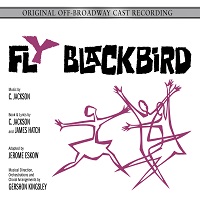 Original Off-Broadway Cast, 1962 (Mercury/Stage Door)
Original Off-Broadway Cast, 1962 (Mercury/Stage Door)  (3 / 5) The cast album of this virtually forgotten musical is especially notable for two of its principal cast members: Avon Long, whose lengthy and distinguished career included stage performances and recordings of the role of Sportin’ Life in Porgy and Bess; and Robert Guillaume, whose Broadway appearances in Kwamina, Purlie, and the 1976 production of Guys and Dolls preceded his fame as the star of TV’s Benson. With music by C. Jackson, book and lyrics by Jackson and James Hatch, and with its action taking place in New York City in the early 1960s, Fly Blackbird concerns the struggle for African-American civil rights as seen from the differing points of view of an older black man and members of a younger generation. Long’s character counsels patience in achieving racial equality and overcoming discrimination, while his daughter (Mary Louise), her boyfriend (Guillaume), and other young people take an activist approach. The song titles — “Everything Comes to Those Who Wait,” “Now,” “Mister Boy,” “Old White Tom,” “Wake Up,” etc. — give a pretty good idea of the story. One of the highlights of the score is “Natchitoches, Louisiana” in which a black police officer (Leonard Parker) and a white prison matron (Helon Blount) learn that they may have a lot more in common than was at first apparent. The show’s lyrics are sometimes a bit pedestrian but sincere, and they’re set to attractive if not especially memorable melodies by Jackson. — Michael Portantiere
(3 / 5) The cast album of this virtually forgotten musical is especially notable for two of its principal cast members: Avon Long, whose lengthy and distinguished career included stage performances and recordings of the role of Sportin’ Life in Porgy and Bess; and Robert Guillaume, whose Broadway appearances in Kwamina, Purlie, and the 1976 production of Guys and Dolls preceded his fame as the star of TV’s Benson. With music by C. Jackson, book and lyrics by Jackson and James Hatch, and with its action taking place in New York City in the early 1960s, Fly Blackbird concerns the struggle for African-American civil rights as seen from the differing points of view of an older black man and members of a younger generation. Long’s character counsels patience in achieving racial equality and overcoming discrimination, while his daughter (Mary Louise), her boyfriend (Guillaume), and other young people take an activist approach. The song titles — “Everything Comes to Those Who Wait,” “Now,” “Mister Boy,” “Old White Tom,” “Wake Up,” etc. — give a pretty good idea of the story. One of the highlights of the score is “Natchitoches, Louisiana” in which a black police officer (Leonard Parker) and a white prison matron (Helon Blount) learn that they may have a lot more in common than was at first apparent. The show’s lyrics are sometimes a bit pedestrian but sincere, and they’re set to attractive if not especially memorable melodies by Jackson. — Michael Portantiere
Floyd Collins
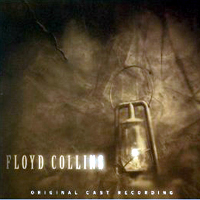 Original Off-Broadway Cast, 1996 (Nonesuch)
Original Off-Broadway Cast, 1996 (Nonesuch)  (5 / 5) In telling this bleak, based-in-truth story of a Kentucky man trapped in a cave and the media circus that surrounds him and his family during the ordeal, composer Adam Guettel — the grandson of Richard Rodgers, and a poster boy for the new wave of American musical theater composers — married bluegrass and classical strains to create an utterly unique sound that echoes with Appalachian authenticity. Some “old school” enthusiasts may not appreciate Guettel’s musical audacity, whether it’s the yodeling in “The Call” or the meandering gorgeousness of “Daybreak.” But the title folk ballad, the rollicking “Riddle Song,” and Floyd’s intensely moving spiritual vision “How Glory Goes” have won over even some of the most hardened purists. As for Guettel’s lyrics, they’re colloquial and character-perfect. (Additional lyrics were contributed by Tina Landau, the author of the show’s book.) This excellent recording preserves the performances of an outstanding cast including Christopher Innvar in the title role, the clarion-voiced Jason Danieley as his brother Homer, and the incomparable Theresa McCarthy as their touched-in-the-head sister. Bruce Coughlin contributes excellent orchestrations that make use of acoustic guitar, banjo, and harmonica in concert with more traditional musical theater instrumentation. — Brooke Pierce
(5 / 5) In telling this bleak, based-in-truth story of a Kentucky man trapped in a cave and the media circus that surrounds him and his family during the ordeal, composer Adam Guettel — the grandson of Richard Rodgers, and a poster boy for the new wave of American musical theater composers — married bluegrass and classical strains to create an utterly unique sound that echoes with Appalachian authenticity. Some “old school” enthusiasts may not appreciate Guettel’s musical audacity, whether it’s the yodeling in “The Call” or the meandering gorgeousness of “Daybreak.” But the title folk ballad, the rollicking “Riddle Song,” and Floyd’s intensely moving spiritual vision “How Glory Goes” have won over even some of the most hardened purists. As for Guettel’s lyrics, they’re colloquial and character-perfect. (Additional lyrics were contributed by Tina Landau, the author of the show’s book.) This excellent recording preserves the performances of an outstanding cast including Christopher Innvar in the title role, the clarion-voiced Jason Danieley as his brother Homer, and the incomparable Theresa McCarthy as their touched-in-the-head sister. Bruce Coughlin contributes excellent orchestrations that make use of acoustic guitar, banjo, and harmonica in concert with more traditional musical theater instrumentation. — Brooke Pierce
Flowers for Algernon
 Original London Cast, 1980 (Original Cast Records)
Original London Cast, 1980 (Original Cast Records)  (1 / 5) The musical Flowers for Algernon — or, as it was actually titled onstage, Charlie and Algernon — is based on the Daniel Keyes novel about a mentally retarded man, a mouse, and an experimental intelligence-increasing procedure that they undergo together. Charles Strouse’s score contains one terrific song (the title number, a song-and-dance duet), another that could be described as pretty (“Whatever Time There Is”), and two that might be called interesting (“The Maze” and “Charlie”). But on the whole, it’s rather boring and occasionally unpleasant. No better are the lyrics, by David Rogers, who also wrote the libretto. As Charlie, Michael Crawford is utterly annoying for the first half of the disc; once the character achieves a higher level of intelligence, Crawford mercifully lightens up on the squeak factor in his voice. A few of the songs are almost saved by Cheryl Kennedy’s singing (her role is that of Charlie’s doctor/love interest) and/or Philip J. Lang’s orchestrations, but only almost, and the album’s sound quality is weak. The London production was no hit, and a later Broadway version with P.J. Benjamin and Sandy Faison was even less successful. — Seth Christenfeld
(1 / 5) The musical Flowers for Algernon — or, as it was actually titled onstage, Charlie and Algernon — is based on the Daniel Keyes novel about a mentally retarded man, a mouse, and an experimental intelligence-increasing procedure that they undergo together. Charles Strouse’s score contains one terrific song (the title number, a song-and-dance duet), another that could be described as pretty (“Whatever Time There Is”), and two that might be called interesting (“The Maze” and “Charlie”). But on the whole, it’s rather boring and occasionally unpleasant. No better are the lyrics, by David Rogers, who also wrote the libretto. As Charlie, Michael Crawford is utterly annoying for the first half of the disc; once the character achieves a higher level of intelligence, Crawford mercifully lightens up on the squeak factor in his voice. A few of the songs are almost saved by Cheryl Kennedy’s singing (her role is that of Charlie’s doctor/love interest) and/or Philip J. Lang’s orchestrations, but only almost, and the album’s sound quality is weak. The London production was no hit, and a later Broadway version with P.J. Benjamin and Sandy Faison was even less successful. — Seth Christenfeld
Flower Drum Song
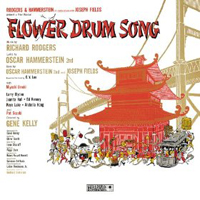 Original Broadway Cast, 1958 (Columbia/Sony)
Original Broadway Cast, 1958 (Columbia/Sony)  (4 / 5) Although Flower Drum Song doesn’t have the substance of most of Rodgers and Hammerstein’s other shows, it features one of the team’s most enjoyable scores. The book — by Hammerstein and Joseph Fields, based on C. Y Lee’s much grittier novel — presents an affectionate portrait of an assimilating Chinese-American middle class and its attendant generation-gap problems. Miyoshi Umeki shines as Mei Li, the Chinese picture bride who finds a new life in America; her renditions of the poetic “A Hundred Million Miracles” and “I Am Going to Like It Here” are marvels of delicacy. Larry Blyden, in a 1950s version of nontraditional casting, is Sammy Fong, the thoroughly Americanized nightclub owner who doesn’t want to marry her; he adds some Broadway zip to “Don’t Marry Me.” Pat Suzuki livens up the proceedings as nightclub star Linda Low, sashaying through “Grant Avenue” and the politically incorrect “I Enjoy Being a Girl” (“I talk on the telephone for hours / With a pound and a half of cream upon my face!”). As Wang Ta, the faithful Chinese son who chafes at parental strictures, Ed Kenney offers a persuasive rendition of “Like a God.” Juanita Hall as the fun-loving, Americanized matron Madame Liang delivers “Chop Suey,” a witty inventory of American culture circa 1958 (“Hula hoops and nuclear war / Dr. Salk and Zsa Zsa Gabor / Harry Truman, Truman Capote, and Dewey / Chop Suey!”). Arabella Hong, as the lonely seamstress who bears unrequited love for Wang Ta, sings the operatic “Love, Look Away.” The show is lively, dated, and slightly silly. — David Barbour
(4 / 5) Although Flower Drum Song doesn’t have the substance of most of Rodgers and Hammerstein’s other shows, it features one of the team’s most enjoyable scores. The book — by Hammerstein and Joseph Fields, based on C. Y Lee’s much grittier novel — presents an affectionate portrait of an assimilating Chinese-American middle class and its attendant generation-gap problems. Miyoshi Umeki shines as Mei Li, the Chinese picture bride who finds a new life in America; her renditions of the poetic “A Hundred Million Miracles” and “I Am Going to Like It Here” are marvels of delicacy. Larry Blyden, in a 1950s version of nontraditional casting, is Sammy Fong, the thoroughly Americanized nightclub owner who doesn’t want to marry her; he adds some Broadway zip to “Don’t Marry Me.” Pat Suzuki livens up the proceedings as nightclub star Linda Low, sashaying through “Grant Avenue” and the politically incorrect “I Enjoy Being a Girl” (“I talk on the telephone for hours / With a pound and a half of cream upon my face!”). As Wang Ta, the faithful Chinese son who chafes at parental strictures, Ed Kenney offers a persuasive rendition of “Like a God.” Juanita Hall as the fun-loving, Americanized matron Madame Liang delivers “Chop Suey,” a witty inventory of American culture circa 1958 (“Hula hoops and nuclear war / Dr. Salk and Zsa Zsa Gabor / Harry Truman, Truman Capote, and Dewey / Chop Suey!”). Arabella Hong, as the lonely seamstress who bears unrequited love for Wang Ta, sings the operatic “Love, Look Away.” The show is lively, dated, and slightly silly. — David Barbour
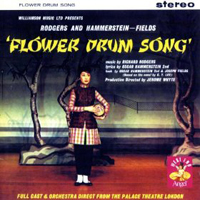 Original London Cast, 1960 (HMV/Angel)
Original London Cast, 1960 (HMV/Angel)  (2 / 5) As Mei Li and Sammy Fong, Yau Shaun Tung and Tim Herbert aren’t as distinctive as their Broadway counterparts. Surprisingly, this recording really comes to life in the nightclub numbers “Grant Avenue,” “Fan Tan Fannie,” and “Gliding Through My Memoree,” all of which are even bolder than before. Yama Saki gives a vivacious performance as Linda Low; with her strong belt and aggressive manner, she brings a great sense of fun to her songs. While this recording is no substitute for the original, it’s a nice supplement to it. And it’s amusing to note one textual change: On the Broadway album, in “Gliding Through My Memoree,” the nightclub singer tells a chorus girl to say something in Irish, and she replies, “Elin Go Blah!” On the London album, the same request is met with “Blendan Beehan!” — D.B.
(2 / 5) As Mei Li and Sammy Fong, Yau Shaun Tung and Tim Herbert aren’t as distinctive as their Broadway counterparts. Surprisingly, this recording really comes to life in the nightclub numbers “Grant Avenue,” “Fan Tan Fannie,” and “Gliding Through My Memoree,” all of which are even bolder than before. Yama Saki gives a vivacious performance as Linda Low; with her strong belt and aggressive manner, she brings a great sense of fun to her songs. While this recording is no substitute for the original, it’s a nice supplement to it. And it’s amusing to note one textual change: On the Broadway album, in “Gliding Through My Memoree,” the nightclub singer tells a chorus girl to say something in Irish, and she replies, “Elin Go Blah!” On the London album, the same request is met with “Blendan Beehan!” — D.B.
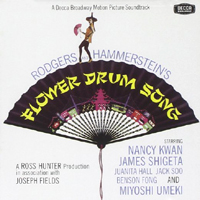 Film Soundtrack, 1961 (Decca)
Film Soundtrack, 1961 (Decca)  (1 / 5) Ross Hunter’s film adaptation of Flower Drum Song is a camp classic. You know you’ve departed from reality in the first scene, when Mei Li and her father emerge from a shipping crate (smuggled in from China) looking perfectly coiffed and made up. It gets sillier from there, with a grotesquely overblown dream ballet attached to “Love, Look Away” (the vocal dubbed by Marilyn Horne). The “Sunday” sequence is equally blown up. The film score disappoints in eliminating “Like a God,” and the running time of the soundtrack album is padded with instrumental tracks. Umeki and Hall, retained from Broadway, are still charming. Jack Soo is fine as Sammy Fong, and B.]. Baker, dubbing Linda Low’s songs for Nancy Kwan, provides lively vocals. A CD bonus track features Rosemary Clooney singing “Love, Look Away.” — D.B.
(1 / 5) Ross Hunter’s film adaptation of Flower Drum Song is a camp classic. You know you’ve departed from reality in the first scene, when Mei Li and her father emerge from a shipping crate (smuggled in from China) looking perfectly coiffed and made up. It gets sillier from there, with a grotesquely overblown dream ballet attached to “Love, Look Away” (the vocal dubbed by Marilyn Horne). The “Sunday” sequence is equally blown up. The film score disappoints in eliminating “Like a God,” and the running time of the soundtrack album is padded with instrumental tracks. Umeki and Hall, retained from Broadway, are still charming. Jack Soo is fine as Sammy Fong, and B.]. Baker, dubbing Linda Low’s songs for Nancy Kwan, provides lively vocals. A CD bonus track features Rosemary Clooney singing “Love, Look Away.” — D.B.
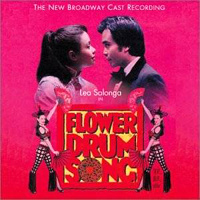 Broadway Cast, 2003 (DRG)
Broadway Cast, 2003 (DRG)  (4 / 5) In David Henry Hwang’s new, politically corrected libretto for Flower Drum Song, Mei Li is an escapee from Communist China who takes refuge in a San Francisco-based Chinese opera theater run by Ta’s father. Madame Liang is now an enterprising press agent who turns the theater into a nightclub that panders to Western audiences with “exotic” shows. Thankfully, Linda Low is still belting “I Enjoy Being a Girl,” and all in all, this disc presents a luxuriously sung version of a delightful score. Lea Salonga’s sweetly seductive voice and powerful belt are tailor-made for Mei Li’s numbers, and Jose Llana is more than a match for her as Ta, especially in “Like a God.” As Madame Liang, Jodi Long leads a zesty version of “Grant Avenue” and partners amusingly with Randall Duk Kim (as Ta’s father) in “Don’t Marry Me.” As Linda, Sandra Allen has plenty of oomph. Don Sebesky’s inventive new orchestrations make extensive use of Chinese harmonies, and he really goes to town in the nightclub sequences, turning “Fan Tan Fannie” into a production number with an irresistible pop beat. Despite the fact that some of the numbers are overextended here, this is probably the most accessible recording of this score for modern ears. — D.B.
(4 / 5) In David Henry Hwang’s new, politically corrected libretto for Flower Drum Song, Mei Li is an escapee from Communist China who takes refuge in a San Francisco-based Chinese opera theater run by Ta’s father. Madame Liang is now an enterprising press agent who turns the theater into a nightclub that panders to Western audiences with “exotic” shows. Thankfully, Linda Low is still belting “I Enjoy Being a Girl,” and all in all, this disc presents a luxuriously sung version of a delightful score. Lea Salonga’s sweetly seductive voice and powerful belt are tailor-made for Mei Li’s numbers, and Jose Llana is more than a match for her as Ta, especially in “Like a God.” As Madame Liang, Jodi Long leads a zesty version of “Grant Avenue” and partners amusingly with Randall Duk Kim (as Ta’s father) in “Don’t Marry Me.” As Linda, Sandra Allen has plenty of oomph. Don Sebesky’s inventive new orchestrations make extensive use of Chinese harmonies, and he really goes to town in the nightclub sequences, turning “Fan Tan Fannie” into a production number with an irresistible pop beat. Despite the fact that some of the numbers are overextended here, this is probably the most accessible recording of this score for modern ears. — D.B.
Florodora
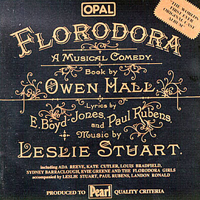 Original London Cast, 1900-15 (various labels/Opal)
Original London Cast, 1900-15 (various labels/Opal)  (2 / 5) The blurb on the CD cover calls this “the world’s first-ever original cast album!” Well, the cast of the 1899 success did enter the Gramophone Company recording studios in 1900 and did commit several songs to wax, including the famous sextet “Tell Me, Pretty Maiden.” But the tracks found on this compilation album range in sound quality from barely audible to unlistenable; indeed, several sound like messages from extraterrestrials. Nearly all are performed to tinny piano accompaniment. Few of the lyrics by Paul Rubens and Frank Clement can be deciphered, and those that can aren’t any great shakes. Still, allowing for the otherworldly quality of the audio, one can tell that Leslie Stuart’s melodies have a nice lilt, and this is a valuable document of the performance styles and stars of the day — stars such as Ada Reeve and Kate Cutler. There’s a goofy track of Louis Bradfield dueting with himself in “Tell Me, Pretty Maiden,” affecting a falsetto for the women’s parts. The album is filled out with solo piano recordings of music from the show, and a track from a 1915 revival that sounds more modern. As an archaeological dig, the CD is a noble attempt and occasionally pleasant listening. — Marc Miller
(2 / 5) The blurb on the CD cover calls this “the world’s first-ever original cast album!” Well, the cast of the 1899 success did enter the Gramophone Company recording studios in 1900 and did commit several songs to wax, including the famous sextet “Tell Me, Pretty Maiden.” But the tracks found on this compilation album range in sound quality from barely audible to unlistenable; indeed, several sound like messages from extraterrestrials. Nearly all are performed to tinny piano accompaniment. Few of the lyrics by Paul Rubens and Frank Clement can be deciphered, and those that can aren’t any great shakes. Still, allowing for the otherworldly quality of the audio, one can tell that Leslie Stuart’s melodies have a nice lilt, and this is a valuable document of the performance styles and stars of the day — stars such as Ada Reeve and Kate Cutler. There’s a goofy track of Louis Bradfield dueting with himself in “Tell Me, Pretty Maiden,” affecting a falsetto for the women’s parts. The album is filled out with solo piano recordings of music from the show, and a track from a 1915 revival that sounds more modern. As an archaeological dig, the CD is a noble attempt and occasionally pleasant listening. — Marc Miller
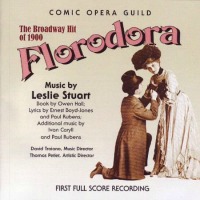 Concert Cast, 2013 (Comic Opera Guild; available through comicoperaguild.org)
Concert Cast, 2013 (Comic Opera Guild; available through comicoperaguild.org)  (3 / 5) The indefatigable Comic Opera Guild had a go at Florodora in 2013, and its recording has one enormous advantage over the “original cast” cylinder tracks: You can hear it. The score is presented more or less complete, and it must be said that Leslie Stuart wrote some good imitation Victor Herbert. The choral work is downright ragged at times, and among the principals, only Natalie Emptage achieves anything like a characterization. But if you want to hear what an utterly typical comic-operetta score sounded like back in the day, or what passed for lyrical wit in 1900, you could do a lot worse. (A double-CD set of this performance, including all the dialogue, is also available, but I’ll pass.) — M.M.
(3 / 5) The indefatigable Comic Opera Guild had a go at Florodora in 2013, and its recording has one enormous advantage over the “original cast” cylinder tracks: You can hear it. The score is presented more or less complete, and it must be said that Leslie Stuart wrote some good imitation Victor Herbert. The choral work is downright ragged at times, and among the principals, only Natalie Emptage achieves anything like a characterization. But if you want to hear what an utterly typical comic-operetta score sounded like back in the day, or what passed for lyrical wit in 1900, you could do a lot worse. (A double-CD set of this performance, including all the dialogue, is also available, but I’ll pass.) — M.M.
Flora, the Red Menace
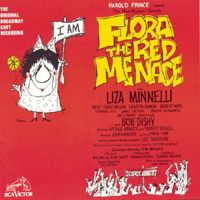 Original Broadway Cast, 1965 (RCA)
Original Broadway Cast, 1965 (RCA)  (3 / 5) John Kander and Fred Ebb’s first show together tells the story of Flora Meszaros (Liza Minnelli), who is thrilled to get a garment-district job during the Depression and even more thrilled to find a boyfriend in Harry Toukarian (Bob Dishy). She isn’t thrilled to find that he’s a Communist, but Flora doesn’t seem to experience much more than mild embarrassment over this state of affairs. There are three wince-inducing songs here (“Knock, Knock,” “Palomino Pal,” and “Hello, Waves”), but ”A. Quiet Thing” and “Sing Happy” are stunners, especially as delivered by Minnelli when she was young and full of potential. Don Walker’s orchestrations enhance the songs, and the overture — which was actually the entr’acte in the theater — is swingin’. — Peter Filichia
(3 / 5) John Kander and Fred Ebb’s first show together tells the story of Flora Meszaros (Liza Minnelli), who is thrilled to get a garment-district job during the Depression and even more thrilled to find a boyfriend in Harry Toukarian (Bob Dishy). She isn’t thrilled to find that he’s a Communist, but Flora doesn’t seem to experience much more than mild embarrassment over this state of affairs. There are three wince-inducing songs here (“Knock, Knock,” “Palomino Pal,” and “Hello, Waves”), but ”A. Quiet Thing” and “Sing Happy” are stunners, especially as delivered by Minnelli when she was young and full of potential. Don Walker’s orchestrations enhance the songs, and the overture — which was actually the entr’acte in the theater — is swingin’. — Peter Filichia
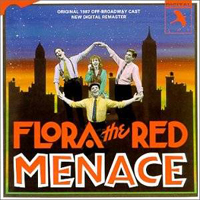 Off-Broadway Cast, 1987 (JAY)
Off-Broadway Cast, 1987 (JAY)  (2 / 5) More than two decades after the failure of Flora, Kander and Ebb — and new book-writer David Thompson — reworked the show for a revival at the Vineyard Theatre, where it was staged in the manner of a Federal Theatre Production of the 1930s. The recording of the revised version would be the reference for any new production, but if you’re only interested in hearing the score, you need not buy this disc, which is quite inferior to the original album. Granted, three of the show’s silliest songs have been excised, and it’s nice to have an extra snippet of a song before “A Quiet Thing,” a verse for “Dear Love,” and some good dialogue leading into “Sing Happy.” But Veanne Cox and Peter Frechette are limp substitutes for Minnelli and Dishy. While John Kander himself plays the piano, his solo accompaniment can’t compare with the original disc’s lush, full orchestra. “The Kid Herself’ track makes it clear why the song was dropped from the original production. Worst of all, a most annoying thematic melody, which would have been a chore to hear even once, interrupts the action six times! — P.F.
(2 / 5) More than two decades after the failure of Flora, Kander and Ebb — and new book-writer David Thompson — reworked the show for a revival at the Vineyard Theatre, where it was staged in the manner of a Federal Theatre Production of the 1930s. The recording of the revised version would be the reference for any new production, but if you’re only interested in hearing the score, you need not buy this disc, which is quite inferior to the original album. Granted, three of the show’s silliest songs have been excised, and it’s nice to have an extra snippet of a song before “A Quiet Thing,” a verse for “Dear Love,” and some good dialogue leading into “Sing Happy.” But Veanne Cox and Peter Frechette are limp substitutes for Minnelli and Dishy. While John Kander himself plays the piano, his solo accompaniment can’t compare with the original disc’s lush, full orchestra. “The Kid Herself’ track makes it clear why the song was dropped from the original production. Worst of all, a most annoying thematic melody, which would have been a chore to hear even once, interrupts the action six times! — P.F.

